Misyon Online - November-December 2014
Pulong ng Editor
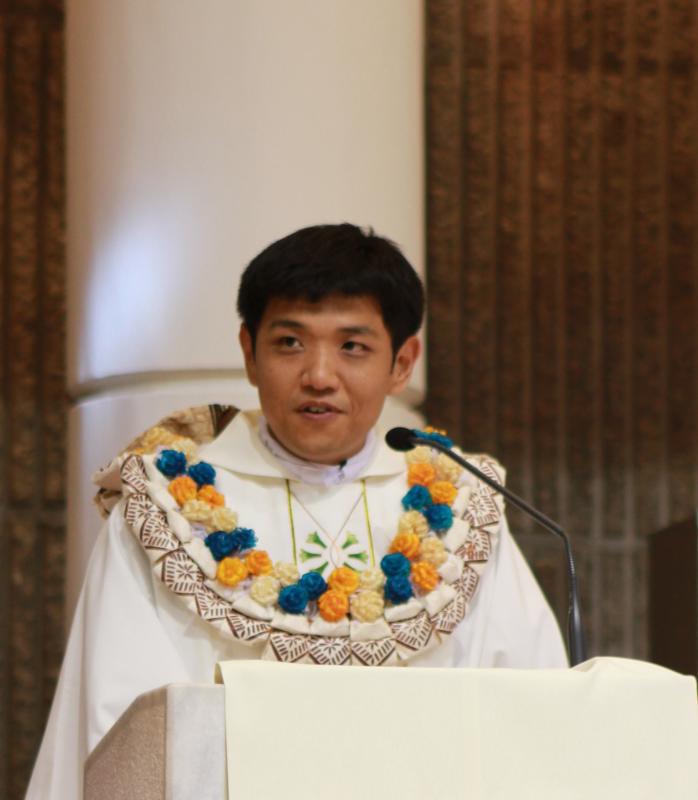
Fr Jehoon Augustine Lee
In Dalgan Park, Ireland, where most Irish Columbans spent seven years preparing to be missionary priests, some of them to be killed in the service of the Gospel, FrSeán Holloway, to whom the Lord had given just over 93 years of life and almost 67 years of priesthood, was laid to rest.
Your editor was present at the ordination of Father Jehoon, a very joyful occasion celebrated almost entirely in the Korean language but with a real dimension of the catholicity or universality of the Church. There were Columban priests who had grown up Australia, Ireland, Korea, New Zealand and the Philippines and Columban lay missionaries from Fiji, Korea and the Philippines. Two of the Filipino priests were working in Mainland China and Hong Kong respectively.
Read story...

Columban Fr Patrick McInerney Meets the Pope
By Fr Patrick McInerney
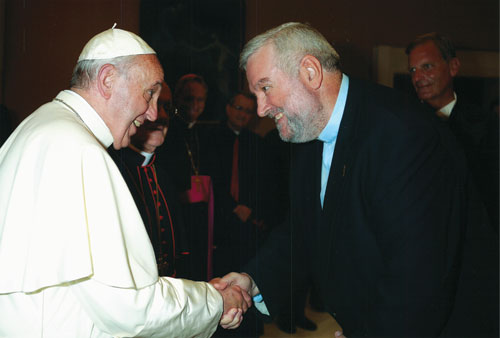
Meeting storekeeper in Jerusalem helped Fr McInerney reflect on where he was really from and meeting Pope Francis helped him reflect on where the center of the Church is.
When Cardinal Tauran presented the newly-elected Pope to the world from the balcony of St Peter's Basilica on the night of Wednesday, 13 March 2013 Pope Francis explained his origins as follows: ‘You know that the work of the conclave is to give a bishop to Rome. It seems as if my brother cardinals went to find him from the end of the earth.’
Read story...

‘I Will Help You Carry Your Cross’
By Luda Egbalic
When I was a child I used to visit San Isidro Cathedral in Malaybalay City, Bukidnon, where I grew up. I would go to the Mass Media Center and read stories of the saints. I was inspired by their good deeds and sacrifices for the Lord. One time when I was praying and gazing at the big cross on the altar, innocently I said to myself, ‘When I grow up, I will help you carry your cross. I will serve you.’

Malaybalay City, with San Isidro Cathedral, lower left.
After my college days, I joined the Canossian Volunteers Philippines. In this program, I was happy serving people in urban and rural areas of Mindanao and Luzon. We called ourselves ‘young missionaries’.
Read story...

Interview with Ronnie
By Fr Chris Saenz
Ronald Daniel Perez Arbazua
Puerto Saavedra, Chile
February 14, 2014
Ronald Daniel Perez Arbazua, known as ‘Ronnie’, is a 69-year-old man who was born and raised in Puerto Saavedra in southern Chile. At the age of 15 Ronnie entered the Chilean Navy and served for eight years. After that he went to Santiago where he lived and worked for 23 years. In 1983 he returned to Puerto Saavedra upon the death of his mother.
In 1995, when I was a seminarian, I was sent to Puerto Saavedra, aColumban parish at that time. There I first met Ronnie as a chronic alcoholic. The few times I saw him sober he was timid and shy. The drink always made him aggressive and belligerent. Often, after drinking, Ronnie would enter the church. Sometimes he would cause a disturbance and twice I had to physically throw him out. I left Puerto Saavedra in 1997 convinced that he would never change and would die on the streets.
In 2001 I returned to Puerto Saavedraas a priest. When I celebrated my first Mass in the town I was surprised to see Ronnie stand up and walk to the lectern to proclaim the First Reading. He was clean-shaven and wearing a suit and tie, and sober! I was shocked by this miraculous change.He stopped drinking completely, reformed his life and was active in the church. For years I talked about Ronnie in my homilies but had never sat down and talked to him about his conversion, until now. Ronnie agreed to be interviewed.
Ronnie, how did you begin your road to alcoholism?
Previously I drank, but not heavily, on some social occasions. In 1983, at the age of 38, I returned to Puerto Saavedra when my mother died. I was an only child, my father had died when I was 23 and my mother was really the only family I had. When she died I entered into depression. That is when I began to drink heavily and continued to drink every day for 18 years.
Read story...


Columbans ‘Who Have Gone Before Us With The Sign Of Faith’ - November 2013 – November 2014
To our departed brothers and sisters
And to all who were pleasing to you
At their passing from this life,
Give kind admittance to your kingdom.
(Eucharistic Prayer II)
Obituaries of Columban Sisters are from the website of the Missionary Sisters of St Columban: www.columbansisters.org
Read story...
The Gift Of Deafness
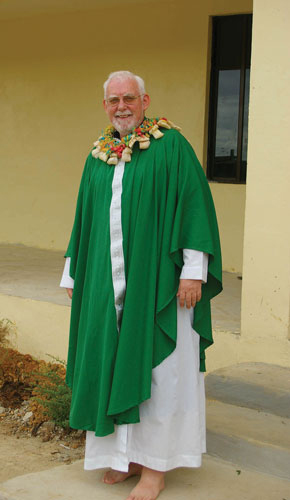 By Fr Thomas Rouse
By Fr Thomas Rouse
Father Tom worked in Fiji most of the time from 1977 until this year. He is now based in Lower Hutt, near Wellington, in his native New Zealand. While in Fiji he served as Regional Director for some years. He served two three-year terms as Regional Director of the Columbans in Fiji, from 2007 until 2013.
It was to the credit of the Columbans that I was accepted as a candidate for priesthood. That was back in 1969 when I was completing Form Seven in high school at St John’s College, Hastings, New Zealand.
Responses of Deaf Filipinos |
Nevertheless I was admitted into the seminary at St Columban’s College, North Turramurra, Sydney, Australia. But, by the end of my first year, it was evident that my speech impediment would be a serious handicap if I wished to progress towards ordained ministry since one of the principal tasks of an ordained priest is to preach. How could I effectively preach if people could not understand what I was saying?
Read story...

The Church Also Needs To Know Migrants Are Not Milking Cows
This article first appeared in the Mabuhay section of Sunday Examiner, the English-language weekly of the Catholic Diocese of Hong Kong in one of its September issues. BethSabado, a nurse from Pagadian City, Zamboangadel Sur, is a Columban lay missionary and has been based in Hong Kong for nearly three years as Coordinator of the Lay Missionary Central Leadership Team. She worked in Taiwan before taking on that position.
HONG KONG (Mabuhay): Migrant workers in Hong Kong frequently describe themselves as milking cows in the eyes of their government and families.
A usual Sunday crowd in HK
But Beth Sabado, a lay missionary to Taiwan and nine-year veteran manager of a migrant refuge in Taoyuan, says that the Church should be added to the list of those seeking to squeeze the bit of extra money out of them.‘People back home think that just because they are working overseas that they have plenty of money’, she told Mabuhay on 17 September.
‘It is not uncommon for them to get letters appealing for money for a new chapel or something in their home parishes, when the workers themselves are really struggling to make ends meet’, she continued.
Read story...

Our Hideaway
By Gracebelle Montecillo Parreño
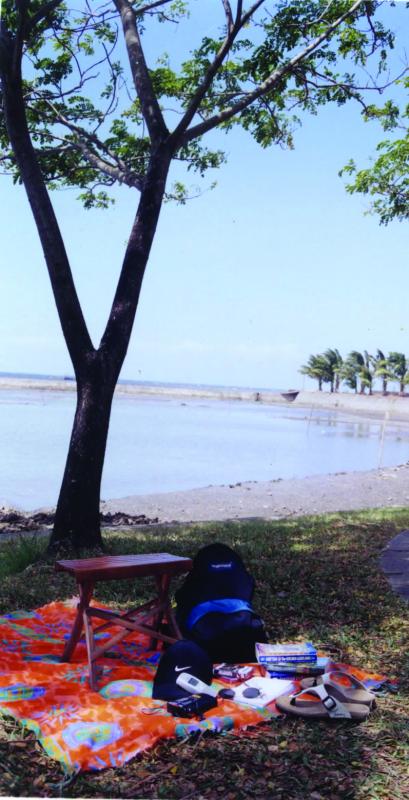 Seven years ago, someone broke my heart. It was shattered into pieces to the extent that it even made me think that it couldn’t be repaired again. It made me weak and I lost my self-esteem. I started questioning myself if there was something wrong with me. Then my mother came into the picture and said to me, ‘Come to Him and pray for him; surrender all your heartaches to Him and you’ll be alright.’
Seven years ago, someone broke my heart. It was shattered into pieces to the extent that it even made me think that it couldn’t be repaired again. It made me weak and I lost my self-esteem. I started questioning myself if there was something wrong with me. Then my mother came into the picture and said to me, ‘Come to Him and pray for him; surrender all your heartaches to Him and you’ll be alright.’
From then on, I became a frequent visitor to the Adoration chapel. I always cried there and I spent months talking to Him, sharing my problems with Him. Every time I left that chapel, I felt great as, if I was whole again. I became strong; I got back my confidence and became a smiling person.
I was like that until I graduated from college. Then it was time for on-the-job training (OJT), I tried my best with all the companies that came to our school but I ended up a failure. At first I asked myself if I had done wrongbut then came to realize that I just needed to trust Him in whatever plans He had for me.
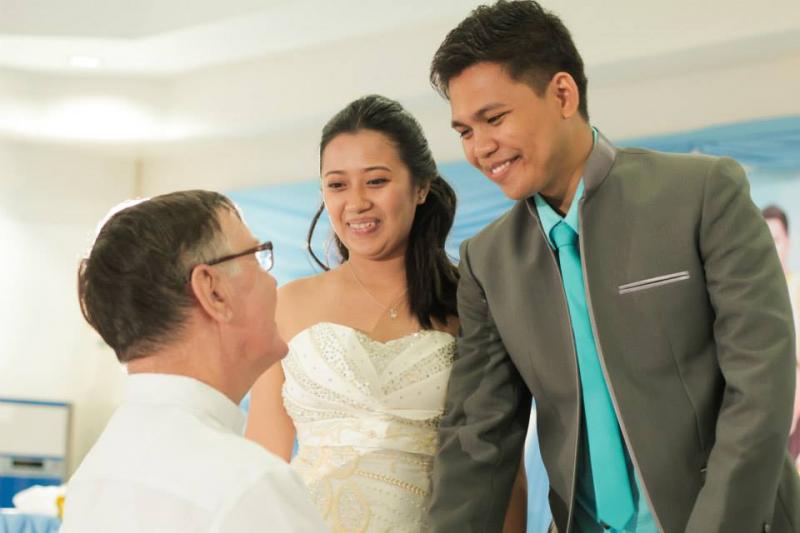
Three months later a company came along and I was hired as their new OJT employee. I met many people, learned practical things and befriended all of them except one. He was my mentor that time and we hated each other. He seemed to be so cruel to me; he didn’t want me to tag along with him. But on 1 May 2010, we were chosen to attend the production that day, only the two of us. It was the time that he knew I existed. We spent the whole day talking to each other and enjoying each other’s company.
Read story...

Peace By Peace
‘If you want to make peace, you don't talk to your friends. You talk to your enemies.’
-Blessed Mother Teresa of Calcutta

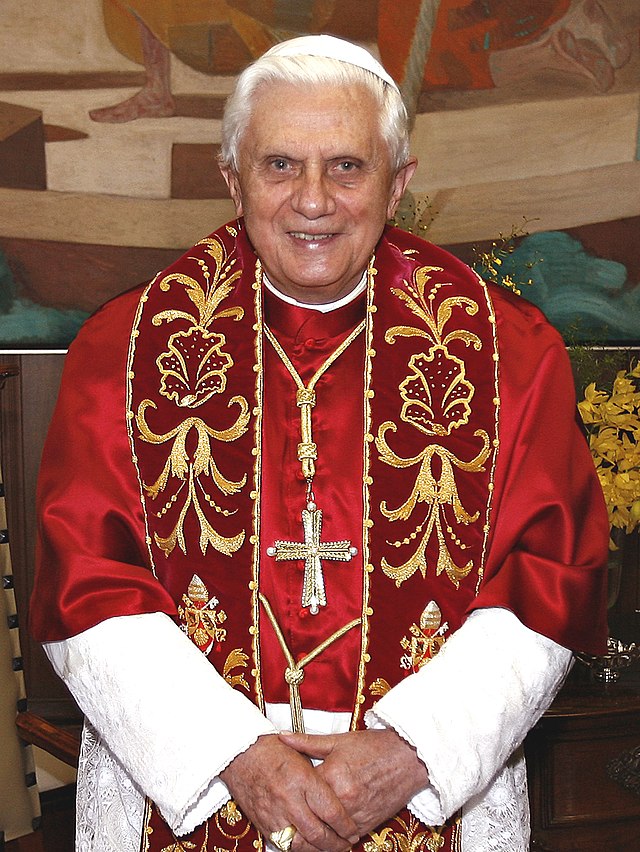
Pope Benedict XVI, 2007 [Wikipedia]
‘Love of God and love of neighbour are thus inseparable, they form a single commandment. But both live from the love of God who has loved us first. No longer is it a question, then, of a “commandment” imposed from without and calling for the impossible, but rather of a freely-bestowed experience of love from within, a love which by its very nature must then be shared with others. Love grows through love. Love is “divine” because it comes from God and unites us to God . . .’
Read story...

Pulong ng Editor

Fr Jehoon Augustine Lee
In Dalgan Park, Ireland, where most Irish Columbans spent seven years preparing to be missionary priests, some of them to be killed in the service of the Gospel, FrSeán Holloway, to whom the Lord had given just over 93 years of life and almost 67 years of priesthood, was laid to rest.
Your editor was present at the ordination of Father Jehoon, a very joyful occasion celebrated almost entirely in the Korean language but with a real dimension of the catholicity or universality of the Church. There were Columban priests who had grown up Australia, Ireland, Korea, New Zealand and the Philippines and Columban lay missionaries from Fiji, Korea and the Philippines. Two of the Filipino priests were working in Mainland China and Hong Kong respectively.
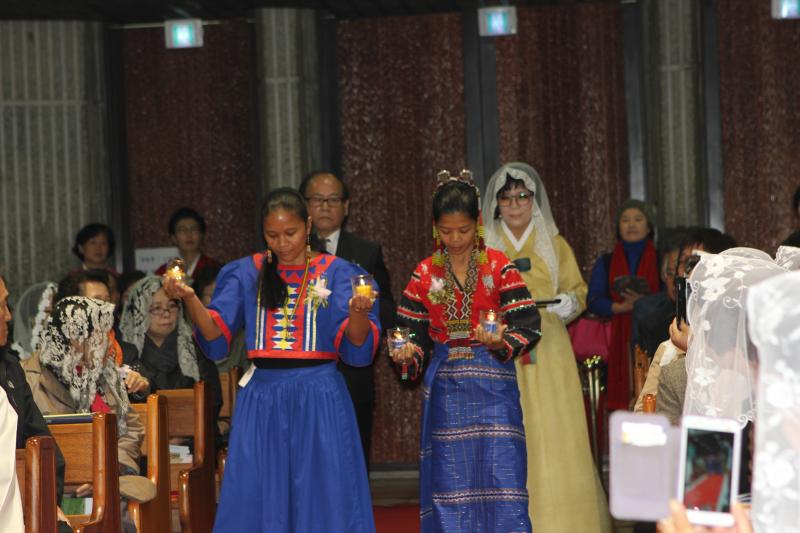
Luda and Jenanydel lead Fr Jehoon's parents in the Offertory Procession
Lay missionaries Maria Rosa Vuniivi read one of the prayers of the faithful in Fijian while Luda Egbalic from the Philippines read one in Tagalog. Luda and her companion, Jenanydel Nola led the offertory procession, each wearing the traditional costume of the tribal peoples they belong to, carrying candles in the palms of their hands, in a gentle dance that was a quiet and solemn expression of faith.
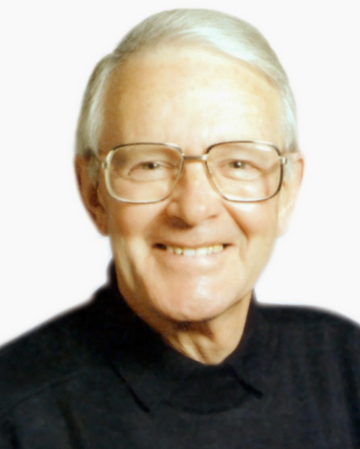
Fr Seán Holloway
25 August 1921 - 29 October 2014
There is always sadness at a funeral but your editor’s experience is that at the funeral of a Columban priest, especially one to whom God has granted many years, there is a very real element of joy. I’m certain that such was the case when his fellow Columbans and family members brought FrSeán Holloway to his final resting place in the cemetery in Dalgan Park. It could not but be for a person described thus in his obituary: ‘A man of great charity and generosity, there was a childlike transparency in him, and a great capacity for making friends, helping persons develop their gifts, and seeing creative possibilities in every situation.’
At the end of his ordination Mass Father Jehoon had a word of thanks for the many people who had encouraged him on his journey of faith. And may that journey be a long and fruitful one.
Father Seán, who spent many years in the Philippines, first in Mindanao and then in Negros, and many more years in Ireland, had a word of thanks at the end of his long life. In his will he wrote: ‘I wish to thank everybody for their personal kindness to me over the many years that the Good Lord has given to me.’
I’m not sure if Luda and Jenanydel, as they carried their lamps in the offertory procession at the ordination Mass were aware of a prayer of St Columban, whose feast day is 23 November, in one of his Instructions: ‘Lord grant me, I pray you in the name of Jesus Christ your Son, my God, that love which knows no fall, so that my lamp may feel the kindling touch and know no quenching, may burn for me and for others may give light.’
May Father Jehoon’s lamp carry the light of Christ for many years and may we pray on behalf of Father Seánthat he may, in the words of St Columban further on in the same prayer, ‘receive perpetual light from you the light perpetual.’

St Columban's Cemetery, Dalgan Park [Photo: FrRollyAniscal]
Christmas Written, Unwritten, and Rewritten
 By Ashraf Khater
By Ashraf Khater
Ashraf was the editor–in-chief for two years of Tolentine Star the official publication of the University of Negros Occidental – Recoletos (UNO-R) in Bacolod City. He graduated Magna Cum Laude last March as a Bachelor of Science in Chemical Engineering. Ashraf was born in Saudi Arabia and raised there until he was 12. Here he shares his experience of Christmas with his fellow student writers.
Christmas is a time when people pause for a while and enjoy the merriment with friends and family. For Tolentine Star, the official student publication of the University of Negros Occidental-Recoletos, (UNO-R), Bacolod City, Christmas is more than just that.
It has been an annual tradition that Advent/Pre-Christmas parties are not just mere get-togethers and food-laden events, but full of learning and its own team building in its own right. Every year, the publication goes on an excursion to celebrate the bond that we have shared and the hard work that we have accomplished throughout the year.
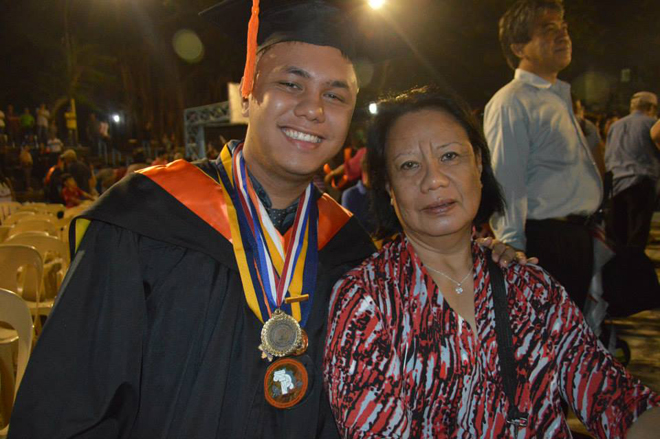
The author with his mother during his graduation day.
The graduating batch is tasked to prepare the festivities, which involves team-building activities. This is a sign of movement and a means of conveying important life lessons to the group of writers that would lead the publication the following year.
This provides everyone with more insight and personal learning that can’t be attained within the four walls of the classroom. Christmas kicks off with this important aspect of each party, and thus it has been a tradition.
The elements that make this Pre-Christmas party an important reminder of our humanity are how they motivate every person in the publication to express themselves in an honest manner and to provide room and potential for growth.
For the seniors, this is a time for reflection and to understand about the transition from student life to real life. For the rest, this is a time for rejuvenation, where they can learn from these stories and change for the better.
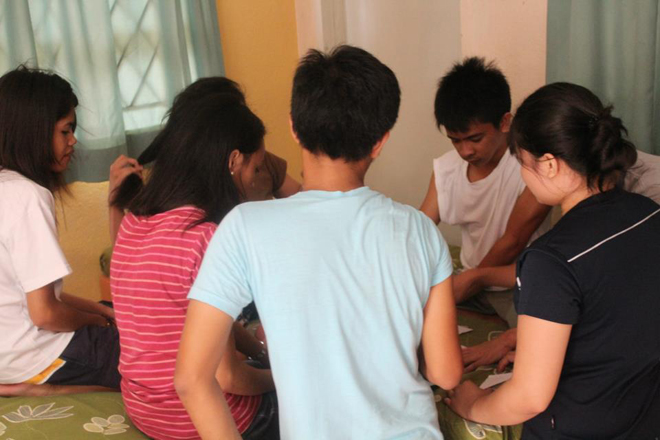
Campus writers team building.
Christmas, after all, is a time for giving. And for forgiving. Past battles and conflicts are put to rest or resolved, because each New Year welcomes in a hope for the better. This repetitive cycle is what renews faith in people because they always desire that second-but-not-so-second chance at proving themselves worthy.
They learn from their mistakes and they improve on them. This is what is important in being part of something bigger. We learn from each other and grow.
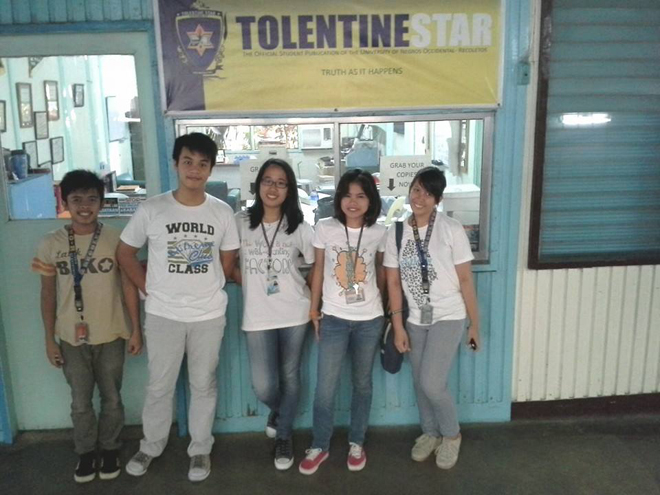
Ashraf's friends outside their school paper office.
Advent parties are not just means of reaching an end—which indicate a simple way to get away from the stress. No. Pre-Christmas parties, especially those in the vision and presentation of the student publication, involve characterizing one’s true self through that symbolic transition from one year to another.
Christmas written means to present all sentiments and all values to the group so that each one may learn and understand the perception of the other. Christmas unwritten involves stripping away negative traits and unraveling negative tendencies so that people accept weaknesses and grow. Christmas rewritten means to take a new step into the known, trusting in the sanctity of tomorrow to provide more insight that people lacked today.
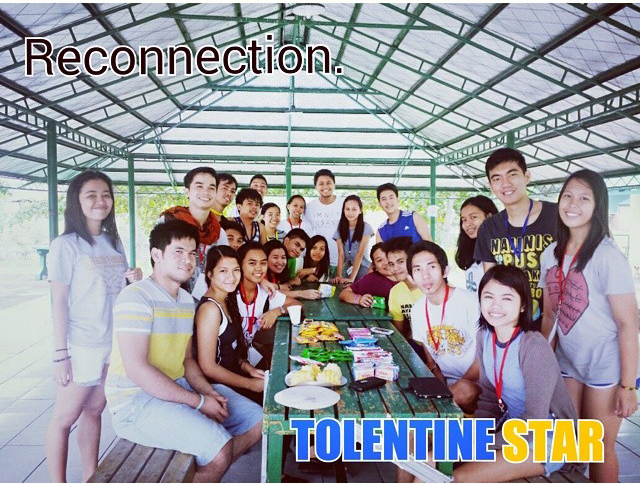
After all, Christmas is about the spiritual guidance that we attain by taking that leap of faith. That leap of faith with peers who are willing to grow with us. After all, the best of victories are the plunges of faith.
Christmas in California – ‘Pinoy Style’ Reflecting on Traditions
By Belle Ross
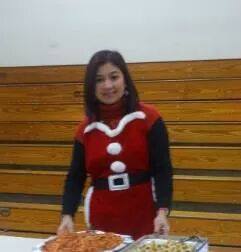 That famous line ‘It's More Fun in the Philippines’ holds true in every Filipino heart, especially those who are based in different countries whether for work or having migrated for good. Once you've been born, raised and experienced our culture and traditions in our homeland, it is difficult not to miss what we've gotten used to, especially during the Advent-Christmas holiday season.
That famous line ‘It's More Fun in the Philippines’ holds true in every Filipino heart, especially those who are based in different countries whether for work or having migrated for good. Once you've been born, raised and experienced our culture and traditions in our homeland, it is difficult not to miss what we've gotten used to, especially during the Advent-Christmas holiday season.
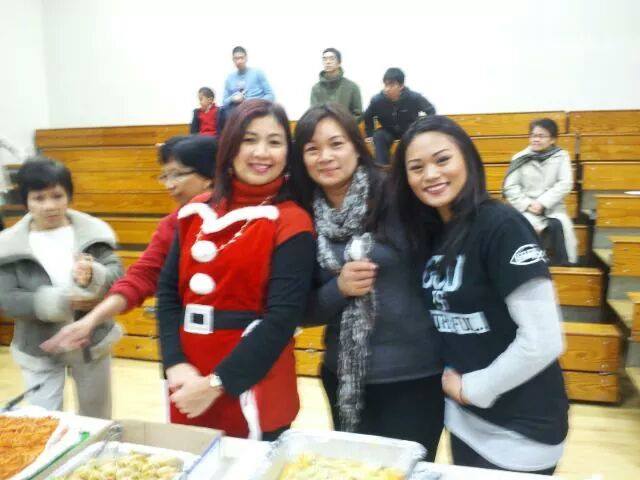
Belle with her Filipino friends at their charity event
It always fascinates me whenever I am asked how we spend Christmas in the USA. Is it as exciting as the festivities in our country? For me, nothing beats Christmas in the Philippines. Our country is said to have‘the world's longest Christmas season’, starting in September, the first of the ‘B-E-R’ months of September when malls and radio stations begin playing Christmas music, and extending up to the Feast of Epiphany or ‘The Three Kings’.

Parol made from capiz shells [Wikipedia]
Living here in the States for the past 18 years and facing the challenges of making a name, finding a job, and creating a home in a foreign land. Walking away from what is familiar and safe is not easy. As a mother of three, raising my boys to have a strong desire to uphold each and every tradition into which I was born, is indeed a test of my faith and ingenuity in a place where we are surrounded by a diverse group of people with different religions and beliefs.
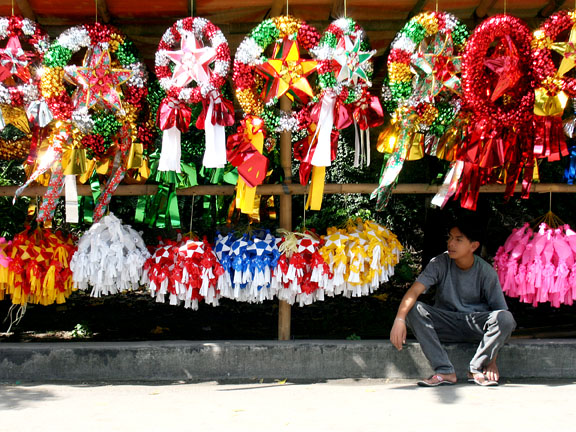
Parol vendor, Philippines [Wikipedia]
I look forward to this season each year, a special time to celebrate God’s love for us and our love for God, which brings us to our roots to discover ways and means to be closer to Him and to pass these along to our family.
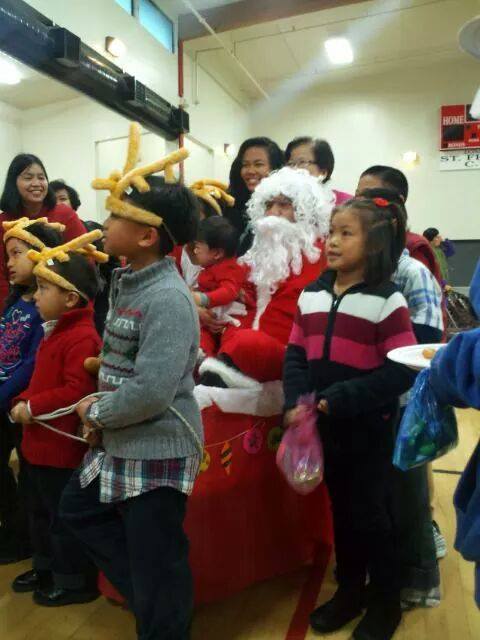
There are numerous fun ways to celebrate Pasko here in the States as closely as possible to the Philippine way. I found it fortunate for us to have may Filipino/Oriental stores and restaurants near where we live,making it possible to enjoy the food and other delicacies we've gotten accustomed to. Another factor is the availability of The Filipino Channel (TFC) where we can watch the latest news and happenings in the country we all miss. I also think that in every Pinoy household, you can find a karaoke unit and when you drive-by a house with a parol hanging outside their home proudly, you'll know a Pinoy lives there. This is also the season where we fill-up Balikbayan boxes to bring joy to our loved ones back home.
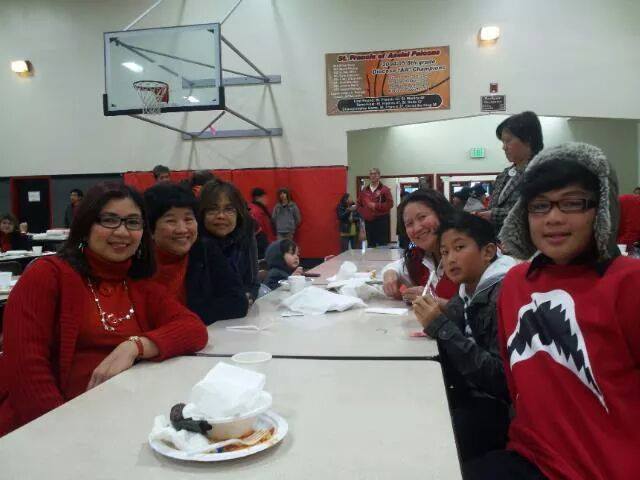
In our community we observe the traditional Simbang Gabi or nine pre-dawn Masses beginning on the 16th of December. It is one of our most popular traditions, a significant moment not only because it strengthens relationships among family members and parishioners but also because it is the time where our faith is intensified. This is one of the highlights of the season in my family where my children at a very young age had been exposed to practicing this yearly tradition despite the freezing cold and sometimes rain, waking up at dawn. All were in good spirits to be a part of this festivity.It does not matter if one has the stamina to complete the novena or not,what really matters is what is inside the heart. The blessing does not depend on the number of Masses attended. What is important is the disposition of the person who receives the Lord's blessing. In order to accommodate the needs of people on a great variety of work schedules, our parish, Christ the King, hold a 6:30 evening Simbang Gabi in addition to the early Mass at dawn. A traditional Pinoybreakfast is served after each Mass witharrozcaldo, putobumbong, bibingka,pandesal, salabat and many other delicacies.
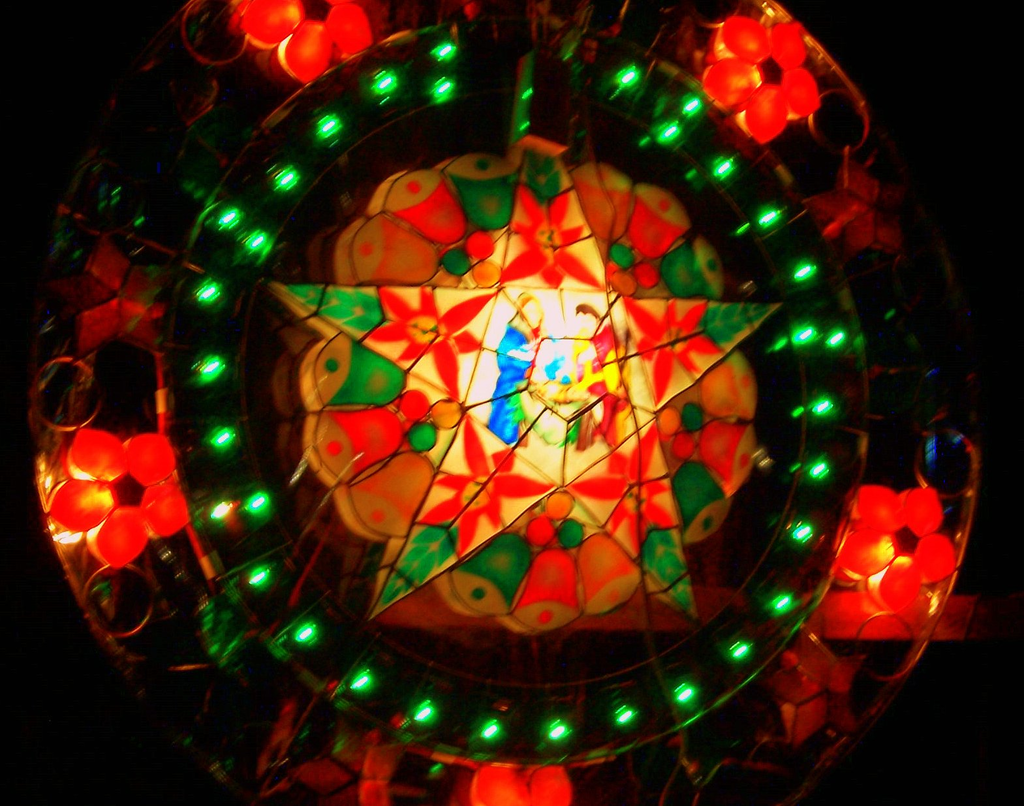
Electric parol [Wikipedia]
For the past 15 years, our family has been doing its share in contributing to the community by holding a ‘Share Your Blessing Annual Event’. This is done by singing Christmas carols in different establishments and homes and the funds are donated to our chosen recipient for that year.
This is the time of the year when we can gather and unite as a community and celebrate the real meaning of Christmas. It provides a strong indication of the depth of Catholicism in the hearts of Filipinos which serves as a spiritual nourishment wherever we may be.
It opens up our hearts to joy as it gives us a reason to celebrate hope, charity, triumph and adversity.
‘Maligayang Pasko at Manigong Bagong Taon!’
Christmas in Japan
Two Reflections by Fr Barry Cairns
The author is from New Zealand and was ordained in 1955. He has been in Japan since 1956. Christmas: on looking at the crib first appeared in the November-December 2013 issue of The Far East, the magazine of the Columbans in Australia and New Zealand. Christmas in Japanwas first published in the November-December 2012 issue.
Christmas: on looking at the crib
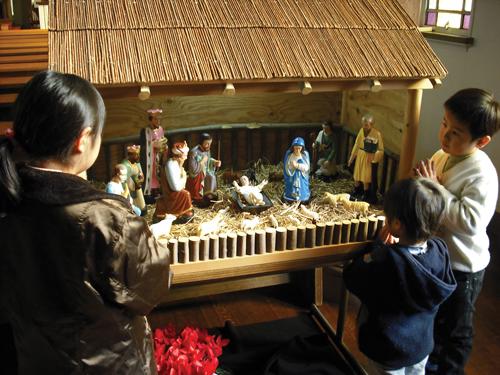
Some time ago I was travelling by train from Yokohama to Odawara. In the carriage sitting opposite me I watched a young mother cuddling her baby. The baby was so tiny, so vulnerable, so dependent on its mother.
I wonder if any of us, given the choice, would come into this world in such a fragile condition. I doubt it.
But that is exactly what Jesus was willing to do for us. The Son, the second Person of the Trinity, chose to put aside the power and glory of God and become a weak, fragile human just like us. Jesus was a baby and like the baby in the train was completely dependent on his mother, Mary.
Let us look at the Christmas Crib and ponder this: our God deliberately took on our human weakness and consequent reliance on another. Jesus did this because he loves each one of us in our human frailty. That frailty which Jesus willingly accepted made him one of us and also made him our human representative before God.
This is what led him to offer his life for us, his brothers and sisters, on the Cross. The Crib and the Cross are intimately connected.
Merry Christmas and Happy New Year from Japan!
Jesus says to each of us: ‘Unless you become as a little child you cannot enter the Kingdom of Heaven’ (Matt: 18:3). Jesus does not mean that we become childish. He means that as adults we acknowledge our human weakness and become completely dependent on God. He calls on us in our powerlessness to rely on God's strength.
But we humans like to be in control. Christmas is a time when we look at the human infant Jesus in the crib. He is asking us to give up control and put ourselves into the hands of God. ‘Into your hands, Abba, Father-God, I give my life’ (cfLk 23:46).
Our Abba-God is gentle and understanding towards us his children. He wants our happiness. We can trust him when we put our lives in his hands. Let us look at the infant Jesus in the crib and realize how utterly dependent and weak he was.
If we ourselves acknowledge our human powerlessness and hand ourselves over to God we will become free, and more truly human. When God chose to become a weak human like us, he chose to be very close to us.
Our God has experienced the human condition. He accepts as we are in our human frailty.
That is love. That is the meaning of Christmas.
Silent Night sung in Japanese by a choir of Japanese children with André Rieu and his Orchestra

Christmas in Japan
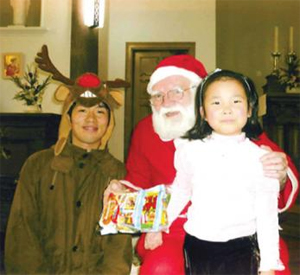
How Japan has put meaning into Christmas for me.
The author in seasonal dress, with some young friends!
Christmas in Japan has caused me to dive into depths of pondering into which I would never have plunged had I not left my own culture.
A Japanese Christmas is so 'Jingle Bellie' so 'Santa Clausie.' Many would not even connect the festivities with Christ. My first reaction as a young priest was to become critical at the gross commercialization. In reaction I emphasized a spiritual Christmas.
But just a minute. This is where I started to ponder. This is when, I feel, a spot of wisdom came with age. There is no such thing as a purely spiritual Christmas.
Our God took on real human flesh. He did not become a pure spirit angel. The birth of Jesus in a drafty stable is not a purely spiritual event. That is the meaning of John 1:14, ‘The word was made flesh’ is niku, which is the common word for meat. Now that is thought-provoking.
In the third century the Gnostics said that the spirit and soul are good, but the body and material things are bad. Threads of this insidious heresy were revived in 18th century Jansenism, traces of which still persist today. We should not belittle the body and material things as if they distract us from the spiritual.
On the contrary the material is the normal gateway to the spirit. The Incarnation means that we humans meet God through the human Jesus. His human heart shows us divine love.
Jesus came for the whole human person. Christmas shows us that there is a mysterious but real unity between the human and the divine, between the spiritual and the secular, between the body and the soul. So let us rejoice in our humanity and in the material. That is the hidden message of Christmas.
I live in Yokohama, a city of 3.7 million people. Even in the suburbs private houses are bedecked with blinking colored lights. Santa Claus too is everywhere. For example a half marathon is run with all wearing red Santa hats. Railing against the absence of Christ in Christmas gets nowhere. I can't beat them, so I join them. I, too, have lights around the Church - they surround a life-size crib, made and painted by three of the parishioners.
Santa Claus is Coming to Town, in Japanese. Karuizawa Junior Chorus
After Christmas Masses I take off the vestments and don a Santa Claus outfit. (From October my white beard is untrimmed and is a genuine Santa length by 25 December). Crowds of children from the local kindergartens and grade schools line up and receive a small gift from Santa Claus Barry Cairns. I tell them about the real Saint Nicholas who was noted for his kindness. I ask the children to do one act of kindness to others. Kindness is essential to Christmas.
I see the surface celebration of Christmas as a modern expression of 'there was no room at the inn.' Two thousand years ago people did not receive Jesus, but he still came. He still comes today. We know the true meaning of Christmas so let us prepare the manger for him in the stable of our hearts.
Let us really share with others the material joys of Christmas. Our warmth can transmit the true message of Christmas to the world.
Angels We Have Heard on High, in Japanese. Karuizawa Junior Chorus
Christmas in Seoul
By Fr Seán Conneely

Columban Fr Sean Conneely, ordained in Ireland in 1969 and working in Korea since then, looks back over the 2012 Advent preparation/ celebrationat the Columban Mission Centre in Seoul, South Korea.
Who was Christ like this year? How Christlike was any of us during the past year?
At Christmas each year the church celebrates the birth of Christ, the baby boy born in Bethlehem over 2000 years ago. God become human to live in our midst to show His love for us.
To help prepare for the liturgy of Christmas we gathered in semi darkness in the main hall of our Columban Mission Centre in Seoul in the Advent spirit of waiting in expectation for the coming of our Saviour. We read some of the main readings from the prophet Isaiah from the daily Masses of Advent and sing Advent hymns. We then moved to the Christmas readings. A young couple with their own children carried the “baby Jesus” in slowly as the gospel was read.
Christmas flash mob in Myongji Hospital, Korea
As the congregation came forward to pay homage to the child in the manger we sang the appropriate Christmas hymns. After some silent reflection we watched a PowerPoint presentation of important events of the last year that relate to the meaning of Christmas in our lives today.
With Christmas coming at the end of the year I like to avail of the occasion of the Christmas liturgy to reflect on and ask ourselves how we have lived Christ's Gospel during the past year. I picked the Gospel of Luke, Chapter 4, verses 14-22, as a theme for our PowerPoint reflection for 2012. In Luke 4 Jesus tells the people what His mission on earth was: To heal the sick, set captives free, share the Good News with the poor.
Luke 4:14-22 (New American Bible, Revised Edition). Jesus returned to Galilee in the power of the Spirit, and news of him spread[a] throughout the whole region. He taught in their synagogues and was praised by all. “The Spirit of the Lord is upon me, Rolling up the scroll, he handed it back to the attendant and sat down, and the eyes of all in the synagogue looked intently at him. He said to them, “Today this scripture passage is fulfilled in your hearing.”And all spoke highly of him and were amazed at the gracious words that came from his mouth. They also asked, “Isn’t this the son of Joseph?” |
|---|
Last year (2012) was a special year in Korea and in many other countries across the world. Many leaders came forward to run as the Presidents of their countries and promised the people how they would set up their “Kingdom”, what their reign would look like. Wars and violence raged on across the world, there were typhoons, floods and many poor and destitute people suffered many calamities. Huge social and economic problems were front page news on a daily basis.
The world today is not much different in such matters than in Christ's time. I felt an important question for us at Christmas to ask was: Were the leaders we choose trying to bring about the Reign of God as in Luke 4 or were they just caring for their own cronies and safe-guarding their own power? Do they plan to set captives free, care for the sick by having good medical programmes, have the good news of faith, truth and justice in their education policies?
Christmas Songs in the Market, Bucheon, a satellite city of Seoul
We looked at some people in power across the world in church and states and ordinary people who in their daily lives seem to be doing their part to set up the kingdom of God here and now and of course as always ask what can I and am I doing?
At the offertory people brought up gifts and symbols and offered prayers that related to our theme in Luke 4.
You can't have Christmas without some fun and joy for the children. Before the final blessing two men in Santa clothes gave out gifts to all.
Amidst the joy and laughter our choir spontaneously led us all in a Korean rendition of Rudolf the Red Nosed Reindeer and other Christmas songs.
Rudolph the Red Nosed Reindeer, sung in Korean by the Wonder Girls
Each year we donate the offertory collection to some urgent cause in our mission countries. Before Christmas this year the Island of Mindanao, in the Philippines, where Columban missionaries work, was devastated by a monster typhoon that ruined the banana crop, destroyed homes and roads and bridges. Our congregation donated generously as they always do, in the spirit of sharing and love of neighbour.
DdukGuk
There is no real festivity in Korea without Duk Guk - Special rice dumpling soup. A group of women, as usual, prepared the food from early in the day for all in attendance. It was much appreciated as it was a cold, cold night. We had some to spare and that was shared with the Filipino migrant workers that had their ceremonies and festivities after we had finished.
We hope and pray that the spirit of sharing and caring will last with us each year at Christmas.
Popular Christmas Songs sung in Korean by soprano Sumi Jo and children’s choir
Columban Fr Sean Conneely had been a missionary in Korea since 1969.
Christmas on Board
By Melbert Mendoza
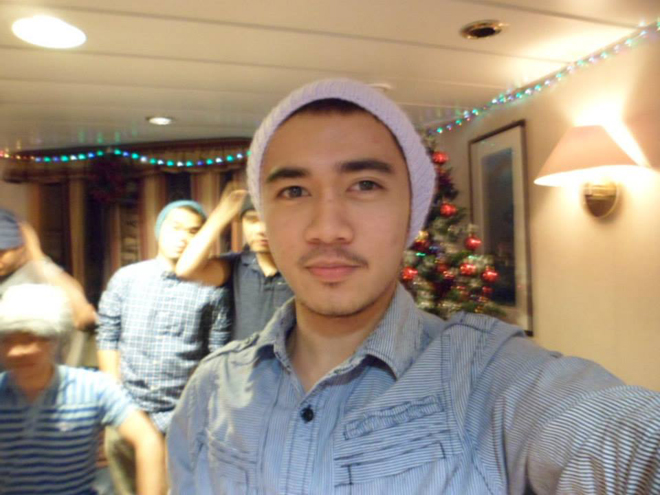
The author is a seafarer. Here he describes how he and his companions celebrated Christmas last year in Aberdeen, Scotland. His ship supplies ‘fuel, fresh water and delivers cargo to oil rigs in the North Sea’.
Aberdeen City Center and Harbor [Wikipedia]
Spending Christmas at home is one of the best feelings that we are blessed to experience throughout our Christian life.Yet I’m quite ‘jealous’ of Christmas because I feel as if it has taken away one of the most memorable days of my life: my birthday which it falls on December 24! I even reached that point when I thought that my existence was no longer important because my family was more focused on celebrating Christmas and not my birthday. However, I would also feel guilty with my thoughts. I knew I should be grateful knowing that I almost had the same birth date as our Savior Jesus Christ. I was thankful because my family would still manage to prepare something for me and that really touched my heart.
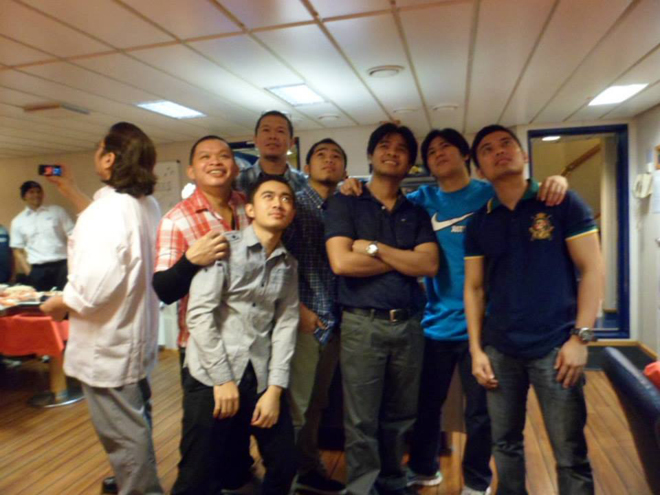
That’s why at home, every single memory is worth remembering, especially the beauty of celebrating Christmas with our family. It doesn’t have to be grand as long as there is enough food and as long as you love, understand and respect each other. That is already awesome. Christmas is a time where families come together to celebrate our Savior’s birth, a time when families share their warm hugs and kisses, a time where families are again physically, emotionally and spiritually reunited as one.
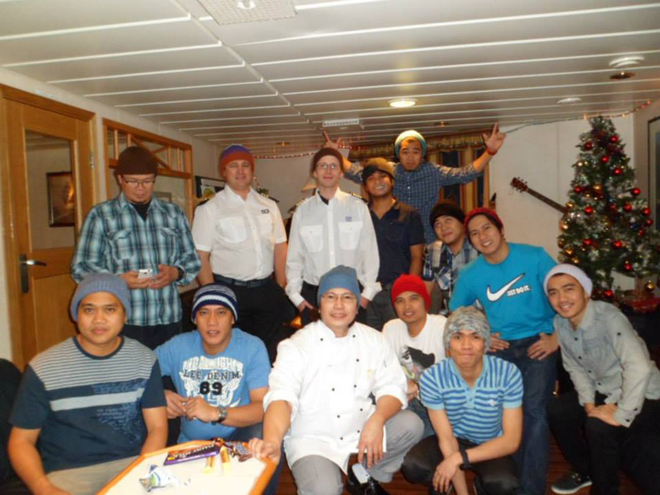
If I had only known that at the time, things would have been different as I grew older, I could have cherished the celebration more. Seafarers like us cannot be with our families physically as much as we want to be.

A typical offshore oil/gas platform or ‘oil rig’[Wikipedia]
Last year I celebrated Christmas with my companions on board. During the feast all of the crew gathered together to give thanks to God for all the blessings He had showered upon us and for giving us strength each day.
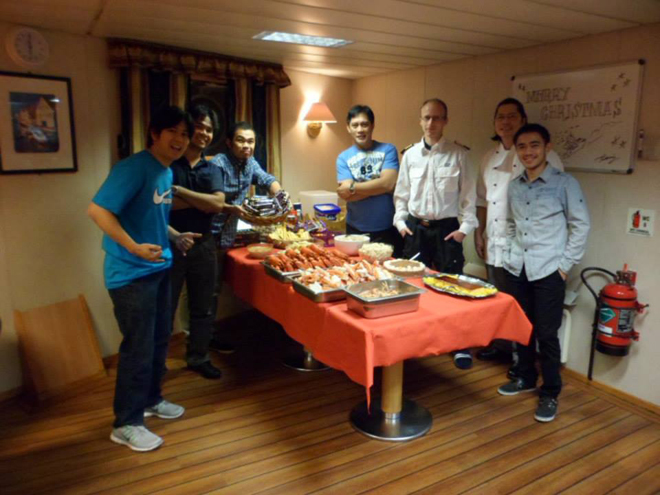
The Child Jesus
Aside from that I was surprised and deeply moved when one of the officers gave us a miniature image of Sto Niño. He brought it all the way from his province. It’s really overwhelming to know that you are remembered. That day I realized that Christmas is not just about eating good food, drinking beer or expensive alcohol beverages, or having fancy materials. It is about growing, learning and experiencing God’s love and being able to share it with other people. It is releasing yourself from so many worries or things that you have done wrong. Yes, it is about forgivingyourself and forgiving others too. It is about freeing yourself from all of the negativities that surrounds you. It is also about clearing your path, embracing yourself and accepting your own flaws and trying to reinvent yourself to be better each time.
Our Longing for the People we Love
Onboard the ship we consider everyone as our family. That’s why during Christmas we intensify our sense of camaraderie through singing with a karaoke, cracking jokes and taking pictures, making silly faces in some of them.In such ways we can lessen our longing for our loved ones. We are continually building a strong foundation of brotherhood as well as we learn to understand and adapt to each other’s attitudes and differences.
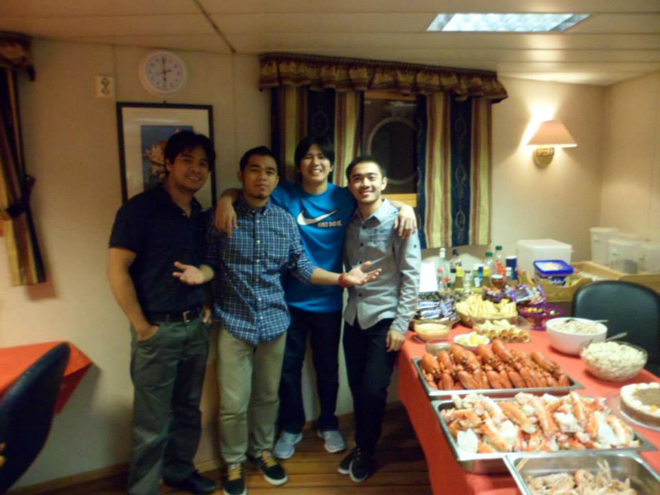
Indeed the season made our faith in God even more firm and stronger. It made us rely on Him in whatever circumstances we may face. Knowing that we have Him, our confidence is boosted every time we sail, for we know that through His guidance, we will be safe and sound.
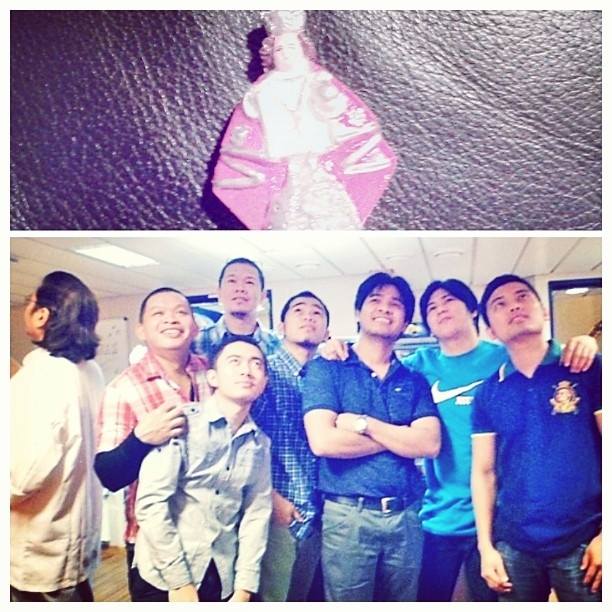
Christmas is definitely a reminder for us to keep our faith and hope alive, in whatever we do, wherever we are or in whatever struggles we may be having. It is that strong spirit that helps us feel loved and at home despite being away from home. It is about putting God on top of everything, surrendering our hearts and giving all of our trust to Him because through Him nothing is impossible.

Two Christmas Songs and One Poem of the Sea
Christmas at Sea
By the Goombay Dance Band
This song by the Goombay Dance Band, a German group, captures something of the experience of Melbert Mendoza and his companions.
Editor’s note: The lyrics are available on many websites but no author/composer is named in any that I opened.
+++
This is Radio Pacific calling M.S. San Doria -Radio Pacific calling M.S. San Doria -Are you receiving me, San Doria? -You'll be in our hearts tonight. And we wish the entire crew a very Merry Christmas.
Christmas at sea - far away from home.
No families and no heavenly snow.
Christmas at sea - visions of home
Sailing tonight all alone.
Black isthe night on the ocean
Candlelight shines on the sea
Everyone's full with emotion -
At homethat's where they long to be.
Mama is reading your letter
Jingle-bells ring all night long.
White are the trees and the meadows -
Children are singing a song.
Christmas at sea - far away from home.
No families and no heavenly snow.
Christmas at sea - visions of home
Sailing tonight all alone.
Midnight is near and we're praying
Everyone fights back his tears.
Lord, bring them home, someone's saying,
And keep them safe while they are here.
This is M.S. San Doria calling Radio Pacific -M.S. San Doria calling Radio Pacific -The whole crew sends it's Christmas wishes. And we're looking forward to seeing you all again soon - Merry Christmas everyone.
Christmas at sea - far away from home.
No families and no heavenly snow.
Christmas at sea - visions of home
Sailing tonight all alone.
Christmas at Sea
By Robert Louis Stevenson
Actor/musician Alan Doyle from Newfoundland, Canada, recites a wonderful poem from the days of sailing ships by the author of Treasure Island.
The sheets were frozen hard, and they cut the naked hand;
The decks were like a slide, where a seaman scarce could stand;
The wind was a nor’-wester, blowing squally off the sea;
And cliffs and spouting breakers were the only things a-lee.
They heard the surf a-roaring before the break of day;
But ’twas only with the peep of light we saw how ill we lay.
We tumbled every hand on deck instanter, with a shout,
And we gave her the maintops’l, and stood by to go about.
All day we tacked and tacked between the South Head and the North;
All day we hauled the frozen sheets, and got no further forth;
All day as cold as charity, in bitter pain and dread,
For very life and nature we tacked from head to head.
We gave the South a wider berth, for there the tide-race roared;
But every tack we made we brought the North Head close aboard.
So’s we saw the cliff and houses and the breakers running high,
And the coastguard in his garden, with his glass against his eye.
The frost was on the village roofs as white as ocean foam;
The good red fires were burning bright in every longshore home;
The windows sparkled clear, and the chimneys volleyed out;
And I vow we sniffed the victuals as the vessel went about.
The bells upon the church were rung with a mighty jovial cheer;
For it’s just that I should tell you how (of all days in the year)
This day of our adversity was blessèd Christmas morn,
And the house above the coastguard’s was the house where I was born.
O well I saw the pleasant room, the pleasant faces there,
My mother’s silver spectacles, my father’s silver hair;
And well I saw the firelight, like a flight of homely elves,
Go dancing round the china plates that stand upon the shelves.
And well I knew the talk they had, the talk that was of me,
Of the shadow on the household and the son that went to sea;
And O the wicked fool I seemed, in every kind of way,
To be here and hauling frozen ropes on blessèd Christmas Day.
They lit the high sea-light, and the dark began to fall.
“All hands to loose topgallant sails,” I heard the captain call.
“By the Lord, she’ll never stand it,” our first mate, Jackson, cried.
. . . .”It’s the one way or the other, Mr. Jackson,” he replied.
She staggered to her bearings, but the sails were new and good,
And the ship smelt up to windward just as though she understood;
As the winter’s day was ending, in the entry of the night,
We cleared the weary headland, and passed below the light.
And they heaved a mighty breath, every soul on board but me,
As they saw her nose again pointing handsome out to sea;
But all that I could think of, in the darkness and the cold,
Was just that I was leaving home and my folks were growing old.
I Saw Three Ships
A traditional Christmas carol from England, sung here by Orla Fallon with an Irish flavor. The verses [in square brackets and italics] are not sung in this version.
I saw three ships come sailing in
On Christmas Day, on Christmas Day;
I saw three ships come sailing in
On Christmas Day in the morning.
[And what was in those ships all three,
On Christmas Day, on Christmas Day?
And what was in those ships all three,
On Christmas Day in the morning?
The Virgin Mary and Christ were there,
On Christmas Day, on Christmas Day;
The Virgin Mary and Christ were there,
On Christmas Day in the morning.]
Pray, whither sailed those ships all three,
On Christmas Day, on Christmas Day;
Pray, whither sailed those ships all three,
On Christmas Day in the morning?
O they sailed into Bethlehem,
On Christmas Day, on Christmas Day;
O they sailed into Bethlehem,
On Christmas Day in the morning.
And all the bells on earth shall ring,
On Christmas Day, on Christmas Day;
And all the bells on earth shall ring,
On Christmas Day in the morning.
[And all the Angels in Heaven shall sing,
On Christmas Day, on Christmas Day;
And all the Angels in Heaven shall sing,
On Christmas Day in the morning.]
And all the souls on earth shall sing,
On Christmas Day, on Christmas Day;
And all the souls on earth shall sing,
On Christmas Day in the morning.
Then let us all rejoice again,
On Christmas Day, on Christmas Day;
Then let us all rejoice again,
On Christmas Day in the morning.
I saw three ships come sailing in
On Christmas Day, on Christmas Day;
I saw three ships come sailing in
On Christmas Day in the morning.
Columban Fr Patrick McInerney Meets the Pope
By Fr Patrick McInerney

Meeting storekeeper in Jerusalem helped Fr McInerney reflect on where he was really from and meeting Pope Francis helped him reflect on where the center of the Church is.
When Cardinal Tauran presented the newly-elected Pope to the world from the balcony of St Peter's Basilica on the night of Wednesday, 13 March 2013 Pope Francis explained his origins as follows: ‘You know that the work of the conclave is to give a bishop to Rome. It seems as if my brother cardinals went to find him from the end of the earth.’
Just over three months later the same Cardinal Tauran invited me to Rome as one of ten delegates from the Catholic world to take part in a meeting of the 'Islamic-Catholic Liaison Committee', on 18-19 June.
The Liaison Committee members and the international Catholic and Muslim delegates were given the privilege of a meeting with the Holy Father after the regular Wednesday morning public audience. It was a clear sign of the Pope’s commitment to and support of interreligious dialogue.
Minibuses transported us to the private audience hall in the Vatican. On the Pope’s arrival, Cardinal Tauran briefed the Pope on what we, the Liaison Committee members, had been discussing. The heads of the respective delegations then introduced their members to the Holy Father. Professor Dr Hamid Bin Ahmad Al-Rifaei introduced each of the members of the Muslim delegation, then Cardinal Tauran did the same for the members of the Catholic delegation.
When it came to my turn, Cardinal Tauran introduced me to the Holy Father as a Columban priest from Australia. I said to Pope Francis, ‘Your Holiness, I too have come to Rome from the end of the earth!’ At this, the Pope burst out laughing and said, ‘Yes, but from the other part!’
I feel enormously privileged to have shared a laugh with the Pope. Filling the shoes of the fisherman is an awesome responsibility. Hopefully, our brief but humorous encounter had lightened his day.
This meeting for me was a profound moment, an experience of shared communion, two missionaries, from different ends of the earth, meeting in Rome. Where is the center of the Church? And where is the periphery?
The center of the Church is neither Rome nor the Pope. Neither are Latin America nor Australia ‘the end’ of the earth. The heart and center of the Church is the people, wherever they are, in Asia, Africa, America, Australia or Europe, and our shared task as missionaries is to reach out to them, to accompany them, to be with them.
One of the gifts the new Pope brings to the Church and to the world is his joy in meeting ordinary people and his taking pleasure in the ordinary things of life. I am sure this wells up from his deep concern for the poor. Pope Francis is simple, humble, a man of the people, for the people. I have been blessed to have met him and I pray that he will continue to lead the Church in the way of the Gospel in the days, months and years ahead.
This article first appeared on the website of the Columbans in Australia and New Zealand.
Where do you come from?
By Fr Patrick McInerney
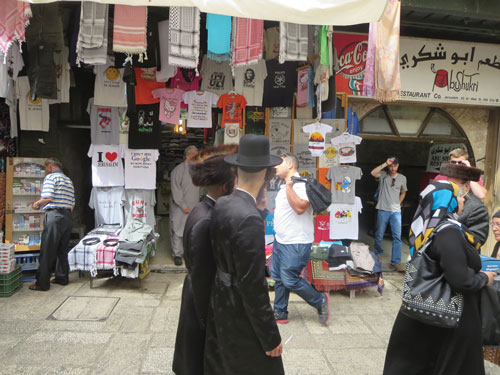
Old Jerusalem
Australian Columban Fr Patrick McInerney is the Director of the Columban Mission Institute, Coordinator of its Centre for Mission Studies and Centre for Christian-Muslim Relations, and the Coordinator of Missiology at the Catholic Institute of Sydney. He spent the early years of his priesthood in Pakistan.
Jerusalem Old City Market
As I walked the venerable cobblestone streets of old Jerusalem where Jesus once walked, the shopkeepers called out to me, ‘Where do you come from?’ When I answered, ‘Australia’, they urged me in English to buy their wares. Such is their linguistic adaptability that had I answered, ‘France’, they would have spoken French, ‘Russia’, they would have spoken Russian, and so on.
I quickly learned to deflect their commercial enticements by asking in turn, ‘Where do you come from?’ Mostly they answered, ‘From here!’ ‘From Jerusalem?’ ‘Yes!’ Mabruk!’ (‘You are blessed!’) In the Muslim quarter the answer was often, ‘From Palestine’. This proud national sentiment was also a political statement, leading to interesting conversations about land, identity and occupation.
One day when I asked, ‘Where do you come from?’ the storekeeper replied, ‘From my mother!’ I laughed. This unexpected reply was so startling that I started using it too, to the puzzlement and amusement of my questioners, leading to very different conversations about identity, nationality and politics.
As I reflected more on this seemingly humorous answer I realized that it is actually very profound.
Each one of is us born of our mother. There is no exception, not even Jesus! If we recognized our common humanity first, rather than our national, ethnic or religious identity, then we would know that the other is my brother and sister and mother, then we would truly realize that we are all children of the one Father in heaven, then we would celebrate our national, ethnic and religious differences, not as dividing us from one another, but as enriching our shared humanity.
Among all the wonderful goods and souvenirs on sale in the markets of Jerusalem, this realization was the most precious gift of all . . . and it costs nothing other than letting go of the narrow stereotypes that limit our appreciation and opening ourselves to the riches which we are to each other. The new question becomes, not ‘Where do you come from?’ but ‘Where are you going?’
This article first appeared in the October 2014 issue of The Far East, the magazine of the Columbans in Australia and New Zealand.
Columbans ‘who have gone before us with the sign of faith’ - November 2013 – November 2014
Interview with Ronnie
By Fr Chris Saenz
Ronald Daniel Perez Arbazua
Puerto Saavedra, Chile
February 14, 2014
Ronald Daniel Perez Arbazua, known as ‘Ronnie’, is a 69-year-old man who was born and raised in Puerto Saavedra in southern Chile. At the age of 15 Ronnie entered the Chilean Navy and served for eight years. After that he went to Santiago where he lived and worked for 23 years. In 1983 he returned to Puerto Saavedra upon the death of his mother.
In 1995, when I was a seminarian, I was sent to Puerto Saavedra, a Columban parish at that time. There I first met Ronnie as a chronic alcoholic. The few times I saw him sober he was timid and shy. The drink always made him aggressive and belligerent. Often, after drinking, Ronnie would enter the church. Sometimes he would cause a disturbance and twice I had to physically throw him out. I left Puerto Saavedra in 1997 convinced that he would never change and would die on the streets.
In 2001 I returned to Puerto Saavedra as a priest. When I celebrated my first Mass in the town I was surprised to see Ronnie stand up and walk to the lectern to proclaim the First Reading. He was clean-shaven and wearing a suit and tie, and sober! I was shocked by this miraculous change. He stopped drinking completely, reformed his life and was active in the church. For years I talked about Ronnie in my homilies but had never sat down and talked to him about his conversion, until now. Ronnie agreed to be interviewed.
Ronnie, how did you begin your road to alcoholism?
Previously I drank, but not heavily, on some social occasions. In 1983, at the age of 38, I returned to Puerto Saavedra when my mother died. I was an only child, my father had died when I was 23 and my mother was really the only family I had. When she died I entered into depression. That is when I began to drink heavily and continued to drink every day for 18 years.
What was the worst thing about alcoholism?
The moments when I was sober I had visions of demons pursuing me. I drank so the visions would stop. After I would wake up in the streets and not remember what happened before. It was terrible.
So what happened? What made you stop?
I remember the day precisely. It was 26 March 2001. I drank so much that I passed out on the street. Somebody rushed me to hospital. I had passed out on the street before during my 18 years of drinking but had never been taken to hospital before. In that moment I felt I had ‘gone away’ but then I suddenly returned to myself. When I woke up I saw Columban Father Michael Howe, parish priest at the time, standing over me, praying and anointing me. I didn’t recognize him. Then the doctor entered and told me that I had alcohol poisoning and that I had been in the hospital for three days!
What more did the doctor say?
He said if I drank another glass I would go directly to the cemetery. The tests they had done on my body showed the damage of my drinking. The doctor made me swear to never drink again. I did so and also promised Padre Hurtado that I would never drink again. I put myself under his protection.
And from that moment you never drank again? You stopped ‘cold turkey’ as we would say in USA?
Yes, I’ve never had a drop since.
After the hospital, what happened next?
I was taken to Hogar de Cristo to begin rehabilitation. There I discovered I had a place to go to. There was a community to share food and life. It was the family that I didn’t have. All prayed for Padre Hurtado to protect me. And it worked! In November 2001 I returned to the doctor and had my check-up. The doctor returned with the results and asked me, ‘What did you do?’ I didn’t know what he meant. He showed me the test result and said that 98 percent of my body was completely healed. ‘It’s nothing short of a miracle,’ he said. I then knew it was a miracle from Padre Hurtado.
What more did Padre Hurtado do for you?
Because of Padre Hurtado I was able to participate in his canonization in Rome in 2005.
How did that happen?
There was a national lottery for Hogar de Cristo to send 36 persons from around the country. There were seven spots for volunteers/workers of Hogar de Cristo and 29 for those who, like me, received aid. Different names were submitted from around the country, including mine and a few others from the Ninth Region.. When the first ticket was drawn at the lottery my name was on it. I knew then it was Padre Hurtado’s hand again. In fact, I was the only one from our Region to go.
So what was the experience like to go to Rome and be at the canonization?
First, the people of Puerto Saavedra raised money for me and gave me a farewell ceremony. I then went to Santiago and joined the group that was going. We had a week of talks, workshops and retreats with the Jesuits. Then we flew to Rome on a military plane, accompanied by President Ricardo Lagos, ministers, and VIPs. But the highlight of it all was the canonization ceremony. It was beautiful. I got to shake the hand of Pope Benedict XVI. For me it was a great privilege to receive after surviving the hell of alcoholism. But, somehow I knew something like this would happen to me.
What do you mean?
Well, before all of this, I had a dream. In the dream I was in a large church filled with people. Suddenly Padre Hurtado arrived, wearing a black cassock. He came up to me and handed me the collection plate and told me to collect from the people. I did, going around the whole church and the people gave. Then I went to Padre Hurtado to give him the collection. He said, ‘Give it to him,’ and pointed to a person dressed in white sitting near the altar, a pope-like figure. Padre Hurtado added, ‘Give all to him. Not a cent is to go to you because it all belongs to the Church.’ And I did. From this dream I understood I was to serve.
How do you serve the Church?
In Hogar de Cristo I was a volunteer, taking food to the bedridden poor. I participated in all the activities of Hogar de Cristo. I even began collecting funds for it. I have since retired from that. In the church I am a lector and participate in the choir. I always help out in the Month of Mary. Father Ulrich once gave me a watch as a gift for being the ‘Best Lector’. Many times the priests will ask if I can participate in the parish council and other meetings.
What can you say about the Columbans?
I admire their work. They are missionaries who leave their country and culture and proclaim Christ in other lands. And they take a big risk of being rejected and maybe even losing their life. Also, I admire how they have to learn other languages.
For you, what makes Columbans different from other priests?
Columbans are very close to the people. They share with all, as the song says ‘Ni importa la razas, ni el color de la piel’. They share with the whole world. They can’t be just in one place; they go where they are sent.
You know several Columbans. Who do you remember the most?
Fr Michael Howe. He was my confessor before I went to Rome. He always said to me, ‘Don’t change. Don’t return to drinking; maintain your faith in God.’ Also, apart from the Columban charisma of ‘being close to the people’, Father Mike is a very mystical, spiritual person. He prays a lot.
What message do you have for our readers?
No one has to feel abandoned; God always gives a helping hand. Also, you don’t have to live in the past, or go back to what was before.
End Note: Ronnie is happily retired. He continues to help the Church and at the end of each Sunday Mass, he collects money for church renovations. As a priest, I am blessed to have known Ronnie. I am happy to say I was wrong about Ronnie, ‘that he would never change and die on the streets’. God proved me wrong and showed me an instant conversion, like that of Saint Paul.

Box
‘Ni importa la razas, ni el color de la piel’
‘Race doesn’t matter, nor the color of the skin’
Cristo te necesita para amar, para amar.
Cristo te necesita para amar. (x2)
Christ needs you to love, to love.
Christ needs you to love. (x2)
No te importen las razas ni el color de la piel.
Ama a todos como hermanos y haz el bien. (x2)
Neither race nor the color of the skin is of importance.
Love all as brothers/sisters and do what is good. (x2)
Al que sufre y al triste dale amor, dale amor.
Al humilde y al pobre dale amor. (x2)
To the suffering and to the sad give love, give love.
To the needy and the poor give love. (x2)
No te importen las razas ni el color de la piel.
Ama a todos como hermanos y haz el bien.(x2)
Neither race nor the color of the skin is of importance.
Love all as brothers/sisters and do what is good. (x2)
Al que vive a tu lado dale amor, dale amor.
Al que viene de lejos dale amor. (x2)
To someone who lives beside you (or with you), give love
To someone who comes from afar, give him love, give love.
No te importen las razas ni el color de la piel.
Ama a todos como hermanos y haz el bien. (x2)
Neither race nor the color of the skin is of importance.
Love all as brothers/sisters and do what is good. (x2)
Al que habla otra lengua dale amor, dale amor.
Al que piensa distinto dale amor. (x2)
To one who speaks a different language give love, give love.
To one who thinks differently, give love. (x2)
No te importen las razas ni el color de la piel,
ama a todos como hermanos y haz el bien. (x2)
Neither race nor the color of the skin is of importance.
Love all as brothers/sisters and do what is good. (x2)
Al amigo de siempre dale amor, dale amor.
y al que no te saluda, dale amor. (x2)
To one who is always your friend give love, give love,
And to the one who doesn’t greet you, give love, give love. (x2)
No te importen las razas ni el color de la piel,
ama a todos como hermanos y haz el bien. (x2)
Neither race nor the color of the skin is of importance.
Love all as brothers/sisters and do what is good. (x2)
Cristo te necesita para amar, para amar.
Cristo te necesita para amar. (x2)
Christ needs you to love, to love.
Christ needs you to love. (x2)
No te importen las razas ni el color de la piel,
ama a todos como hermanos y haz el bien. (x2)
Neither race nor the color of the skin is of importance.
Love all as brothers/sisters and do what is good. (x2)
[Thanks to Fr Jovito Dales for help with the translation.]

Who is Padre Hurtado?
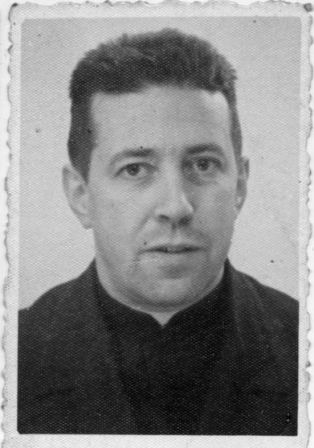
San Alberto Hurtado SJ
Ronnie, the friend of Fr Chris Saenz, Speaks with great fervor and trust in ‘Padre Hurtado’. Who was this man? In the last printed issue of MISYON, March-April 2008, we published A Priest, I bless you – Alberto by Columban Fr John Griffin who died on 25 September this year.
A Hymn to Alberto Hurtado SJ
Written by Pablo Coloma for the beatification of Blessed Alberto on 16 October 1994, Sung by Pablo Coloma and Ximena Concha
Alberto, hoy resuena tu nombre
Se escucha tu palabra encendida
Tu rostro hoy recorre las calles
Tu huella marca un nuevo camino
Profeta que anunciaste el Reino
Supiste denunciar el dolor
Reíste con un canto a la vida
Mostraste un camino mejor.
Alberto, your name resounds today,
your enlightening word is heard,
your face is seen today on the streets,
your footprints mark a new path.
A prophet who proclaimed the Kingdom,
who knew about pain,
who laughed with a song to life,
who showed a better way.
Alberto contemplé tu figura
incendiando las calles de una oscura ciudad.
Y vi que mil rostros reían
y otros más comprendían que era el paso de Dios.
Alberto has tocado nuestra alma
y ya siento que enciende ese fuego de Dios.
Tu vida fue un regalo divino,
una historia que hizo de este Chile un hogar.
Alberto, I watched you
lighting up the streets of a dark city.
And I saw a thousand faces laughing
and others who understood that that was the way of God.
Alberto, you have touched our soul
and I feel that I am lit by the fire of God.
Your life was a divine gift,
a story that made this Chile a home.
Maestro que enseñaste a vivir
la vida como lo hizo Jesús,
mirando en los hombres que sufren
su cuerpo castigado en la cruz.
A teacher who taught how to live
as Jesus did,
looking at those who suffer,
his body punished on the cross.
Apóstol, compañero de pobres,
viviste en tu carne el dolor
de tantos que viván despreciados,
tus manos fueron pan y un hogar.
Apostle, companion of the poor,
you lived in your flesh the pain
of the many who are despised,
your hands were bread and a home.
Alberto contemplé tu figura
incendiando las calles de una oscura ciudad.
Y vi que mil rostros reían
y otros más comprendían que era el paso de Dios.
Alberto has tocado nuestra alma
y ya siento que enciende ese fuego de Dios.
Tu vida derramada en las calles
se alsa inmensa hasta el cielo en las manos de todos.
Alberto, I watched you
lighting up the streets of a dark city.
And I saw a thousand faces laughing and others who understood
that that was the way of God.
Alberto, you have touched our soul
and I feel that I am lit by the fire of God.
Your life poured out on the streets
is infinitely raised to heaven in the hands of all.
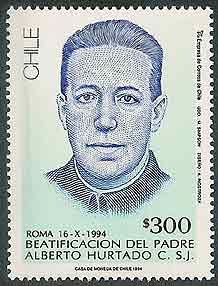
Stamp issued in Chile for the beatification of Fr Alberto Hurtado SJ, 16 October 1994
Hymn for San Alberto's Canonisation
Canción para un santo amigo
Written by Jaime De Aguirre and Sergio Bravo, sung by Cecilia Echenique
Padre Hurtado estas con migo.
Me abres la puerta de tu hogar
Siento que tengo un santo amigo,
un santo que con migo se sienta a conversar.
Father Hurtado, you are with me.
you have opened the door of your home for me;
I feel I have a holy friend,
a saint who sits down to chat with me.
Padre Hurtado tu me pides
que hasta que duela de bodar.
Que nunca puedo conformarme
pues cuando sufre alguien es Cristo que ahíesta.
Father Hurtado, you ask me
to give until it hurts,
that I can never be at ease
because whenever someone suffers Christ is there.
Contento, Señor, contento,
es un regalo de Dios,
un santo que es el milagro
de hacer el mundo mejor.
How joyful, Lord, how joyful,
a saint who is a gift from God,
a miracle
to make a better world.
Lo veo en Valparaíso,
lo esperan en Puerto Montt.
Por todas partes buscando
que a nadie le falte Dios.
I see him in Valparaíso,
they wait for him in Puerto Montt.
Looking everywhere
so that no one will miss God’s presence.
Obrero entre los obreros,
minero en el mineral,
compañero en el trabajo,
amigo en la soledad.
A worker among workers,
a miner among miners,
a companion at work,
a friend in loneliness.
Contento, Señor, contento.
Contento me siento yo.
El santo de los chilenos
hoy llena el mundo de amor.
How joyful, Lord, how joyful.
I feel joyful.
The saint of the Chileans
now fills the world with love.
Padre Hurtado eres conciencia,
conciencia de la humanidad,
sueñas con un país de hermanos
poniendo en nuestras manos el pan de la unidad.
Father Hurtado, you are
the conscience of mankind,
you dream of a country of brothers
holding in our hands the bread of unity.
Padre hoy tienes tantos hijos,
todos te quieren saludar.
Gracias por mostrarme a Cristo, por las obras que yo he visto.
hoy tomo mi lugar.
Father, today you have many children,
all wanting to greet you.
Thank you for showing us Christ, for the works that I've seen.
Today I take my place.
Contento, Señor, contento,
es un regalo de Dios,
un santo que es el milagro
de hacer el mundo mejor.
How joyful, Lord, how joyful,
a saint who is a gift from God,
a miracle
to make the world better.
Lo veo en Valparaíso,
lo esperan en Puerto Montt.
Por todas partes buscando
que a nadie le falte Dios.
I see you in Valparaíso,
they wait for you in Port Montt.
Looking everywhere
so that no one will miss God’s presence.
Contento, Señor, contento.
Contento me siento yo.
El santo de los chilenos
hoy llena el mundo de amor.
How joyful, Lord.
I feel joyful.
The saint of the Chileans
now fills the world with love.
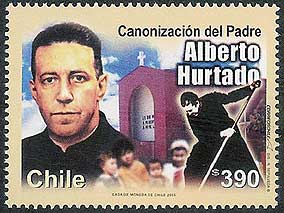
Stamp issued by Chile for the canonization of San Alberto Hurtado, 23 October 2005
Tambuli Ng Panginoon
By Father Colm McKeating SSC
This year the Columbans celebrate their Diamond Jubilee
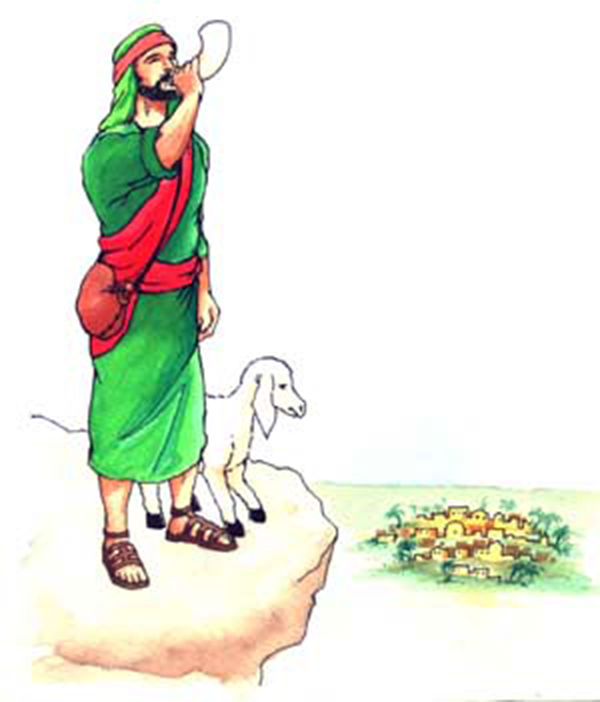 in the Philippines. Our story begins with the arrival of the first priests in
1929 to take up the parish of Malate. Seventy five years on, this Manila parish
is still in our care and has the special merit of being the longest standing
commitment we have in the Columban mission world. From Malate the Society spread
rapidly throughout Luzon and later to Mindanao and the Visayas. In our peak
years in the early seventies we had as many as 260 priests stationed here in
more than ten provinces. Commenting on this development a well-known Jesuit
historian has stated “…it may be seen that there is no other religious order or
congregation whose history encompasses, for longer or shorter periods, so many
different areas of the Philippines” (J.N.Schumacher, Landas, Vol.17, p.306).
in the Philippines. Our story begins with the arrival of the first priests in
1929 to take up the parish of Malate. Seventy five years on, this Manila parish
is still in our care and has the special merit of being the longest standing
commitment we have in the Columban mission world. From Malate the Society spread
rapidly throughout Luzon and later to Mindanao and the Visayas. In our peak
years in the early seventies we had as many as 260 priests stationed here in
more than ten provinces. Commenting on this development a well-known Jesuit
historian has stated “…it may be seen that there is no other religious order or
congregation whose history encompasses, for longer or shorter periods, so many
different areas of the Philippines” (J.N.Schumacher, Landas, Vol.17, p.306).
Venture of faith
There are many ways of telling a story but I think the Columban story in the Philippines is best told as a venture of faith. From this perspective we can perhaps get to the heart of what we are about. One thing is sure: Columbans hold this story sacred for it was inspired and nurtured by faith. Men gave their lives for the sake of others in the course of serving the people. Nine priests suffered violent deaths – during the war, at the time of the Huk rebellion and in Mindanao, even as recently as three years ago. But such human tragedies did not deter us from our mission but only deepened our solidarity with the people. As an aid to reflection, therefore, on our history in the Philippines, I turned to the biblical record of faith, to the passage in the book of Leviticus which describes the Jubilee Year.
Channel of God
This Year is to be proclaimed far and wide; it is not to be forgotten or overlooked. The Yobel (from where the word Jubilee comes) or trumpet is to be heard everywhere declaring a time of rejoicing. However, it is the Lord’s horn, the Tambuli ng Panginoon, that must sound; we are not to blow our own trumpets. For the Jubilee is a time of recognition of the blessings we have received, not an occasion for boasting about our achievements. But if we must boast, it is to “boast in the Lord” and tell about the great things God has done through our hands. We must be allowed to celebrate with pardonable pride the past generations of Columbans.
All about memories
In the Jubilee Year the People of Israel were to have a general homecoming, a return to their roots and family. It was to be a celebration of belonging. Like them we are to recall, to remember, to recollect all that has happened on our missionary journey that has now become part of us. Our precious memories invigorate us; our joys and sorrows are retold and celebrated. In this way the Jubilee becomes an exercise of integration and identity. Who we are and where we belong becomes clear under the light of faith. The Jubilee is a return to the center to repossess and own again our vocation as members of the Columban family.
Our abundant harvest
One of the injunctions of the Jubilee is not to eat of this year’s produce of the land. It is to be left free. No one will go hungry however, for the two or three harvests prior to the Jubilee are so abundant that they are sufficient for everyone’s needs. The point of not reaping this year’s harvest is to allow the land itself to enjoy the fruits of its bounty, to share in the Jubilee and have time to rest. The land must not be simply regarded as a commodity. What a lesson this is today for all of us in the sated world of consumerism, of competitive edge and overproduction, where nature has been scarred. The Jubilee is also a Sabbath, a time for the Lord to remind us that the fruit of our mission is God’s work. We are to let go of whatever accomplishments and possessions we might have had – schools, churches, organizations – they all belong to the land and to the church of the Philippines.
Restoring human dignity
The Jubilee Year offers a special opportunity for redemption. I find the passage from Leviticus peppered with this word and concept. Here it applies primarily to land and property that was lost. For a pastoral people like the Israelites, totally dependent on the land, recovering and reclaiming it meant everything to them. It could be bought back either through their own efforts or with the help of relatives. To possess the land was the guarantee of meeting all the necessities of life. Getting back the land that once belonged to the family also meant reinstating the family in the eyes and estimation of the neighbor. The Jubilee was the time for redemption and the restoration of human dignity.
Columban spirit
Our land, lot and legacy is the missionary charism of the Society. It is always possible to mortgage it away by clinging to false securities and possessions. However, there comes a time to reclaim and recover what we may have lost; to redeem in each of us the spirit of the Society described in our Constitutions. We are asked to appropriate the values on which our missionary life is based: “simplicity in lifestyle, a respect for life in all its forms, a readiness to share with and learn from others, an availability to go where we are sent and a loving celibacy for the sake of the kingdom.”
Our lifetime debt
The Jubilee Year is to be marked by the canceling of debts. There is of course the debt of gratitude and love which can never be canceled. We are indebted to so many people who support us by prayer, friendship and their help; the people whom we are privileged to serve and who keep us faithful to our mission. We are indebted also to those who have offered a vision and a path, the prophets of our time who deepened our understanding of mission today. All of these debts can never be repaid; nor should we ever think of trying to do so. They are all gift and grace. And gratitude is the only adequate response to them. But there are other debts that must be canceled, sins that we must seek forgiveness for and hurts and injuries that must be healed. Among these are the resentments we may harbor, the grudges and misgivings we still bear. Let this Year of Jubilee be a time of reconciliation, of freeing ourselves and others of the burdens we have laid and have failed to lift.
Leviticus 25 ends with the reminder that in the last analysis we are but servants of Jahweh. It tells us we belong to each other and to God precisely as servants: “For to me the Israelites belong as servants; they are servants of mine, because I brought them out of the land of Egypt, I, the Lord, your God” (Lev.25:55). This is the parting shot by which we close a glorious chapter of our history in the Philippines. We treasure the story of the past three generations of Columbans. We give thanks to God and pray that we may continue to follow what is asked of us: “to do justice, to love kindness and to walk humbly with our God” (Micah 6:8)
The 100 Years of Lola Toning
By Dr Ellen Alegrado-Chavez
Then I heard the voice of the Lord, ‘Whom shall I send? And who will go for me?’ I answered, ‘Here I am. Send me!’ (Isaiah 6:8)
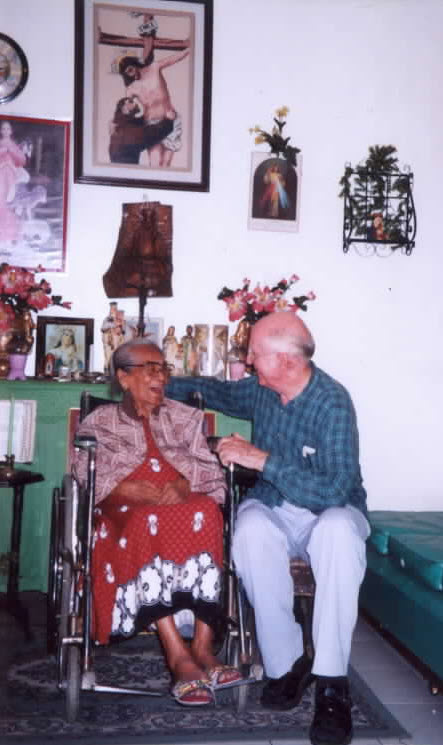
Good shepherds
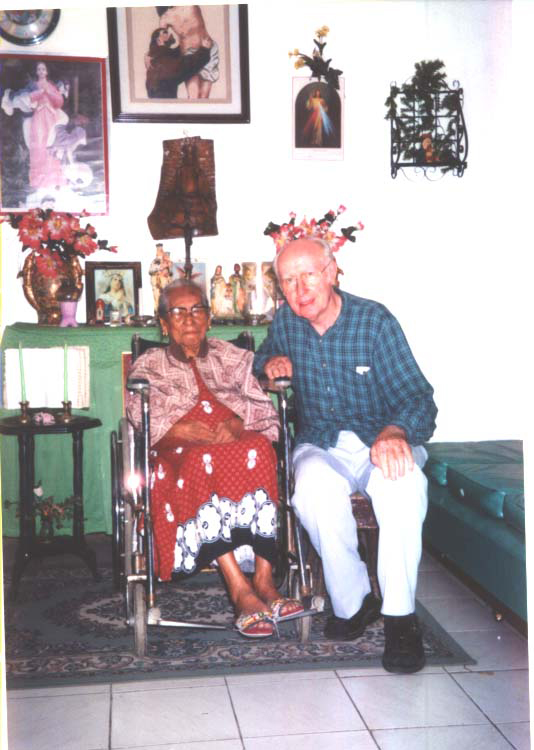
In those early years the priests in Misamis were Jesuit missionaries, among them Father Thomas Gallagher and Father Gabriel Font. In 1939 the Columbans took over, Father Peter Fallon becoming parish priest. He was one of four Columbans killed by the Japanese in Malate in February 1945 during the Battle of Manila. Among the Columbans who worked in the parish over the years were Fr Francis McCullagh and his classmates Fr Francis Chapman who died in March this year aged 90 and Fr Patrick Cronin who became first Bishop of Ozamiz in 1951. Others with whom Inang Toning worked were Fr William Hennessey, Fr James Lillis, Fr Michael Breen and Fr Seán Lavery, all gone to their reward. Still happily working in different places are Fr Con Campion, Fr Seán McGrath, Fr Aodh O’Halpin and Fr Kevin McHugh, to mention but a few.
Catechist by blood
But Inang Toning wasn’t a ‘one-person show.’ From the beginning she trained young women in whom she saw the potential to be catechists. They worked voluntarily not only in Molicay but in the neighboring barrios of Capucao, Gutocan Daku, Gutocan Diyot, Viray, Labo, Embargo, Calabayan, Liposong and Panta-on, to name only some.In 1973 diocesan priests took over from the Columbans in the Cathedral parish. (Now they are in charge of all but one parish in the Archdiocese of Ozamiz.) Around this time my grandparents donated another piece of their land for a school. It is still thriving and is named Domingo A. Barloa Elementary School after Lolo Inggoy who passed away in 1975. Lola Toning continued to teach catechism in the school up to 2000.
Her hundred years
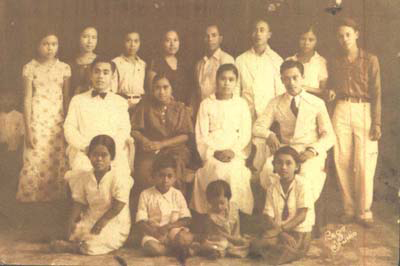
God blessed Tatang Inggoy and Inang Toning with two children. One is my mother, Mrs Dulce B. Alegrado, a retired public school teacher who has spent most of her time helping Ozamiz City Cathedral Parish under Archbishop Jesus A. Dosado CM. She’s still active in the Catholic Women’s League, the Sagrado Corazon de Jesus and the Cofradia del Santo Niño, in which she has served as president for several years now.
‘Spiritual’ descendants
Their only son is Architect Henry C. Barloa, based in Manila, active in the first 400 core devotees of San Lorenzo Ruiz. He has served the Church for free in the designing and restoring of many churches including those in Clarin, Archdiocese of Ozamiz, Kolambugan, Diocese of Iligan, Pagadian Cathedral and the Shrine of La Virgen del Triumfo de la Santa Cruz in Cotta, Ozamiz City.
I am the eldest of Lola Toning’s grandchildren but she, an orphan, has countless ‘spiritual’ descendants in those whom she taught as a catechist and in those taught by the many catechists she trained.
Worker of God
On 14 October 2003 at 10:15 in the evening Lola Toning answered
the call of our heavenly Creator after receiving the Last Sacraments. She left
behind a legacy of service to the Lord through her descendants. In God’s glory
are hopes that just as ‘a sturdy oak eventually falls to give way for young
trees to take root, such is a person of great character who succumbs to death to
be resurrected in the youth and vigor of the descendants.’ Mr & Mrs Domingo and Antonina Barloa, Tatang Inggoy and Inang Toning, Lolo Inggoy and Lola Toning, responded to the mission. We pray that there will be more like them, ready to make themselves available to spread the Good News, the Word of God. God never asks about our ability or inability, just our availability.
The Church also needs to know migrants are not milking cows
This article first appeared in the Mabuhay section of Sunday Examiner, the English-language weekly of the Catholic Diocese of Hong Kong in one of its September issues. BethSabado, a nurse from Pagadian City, Zamboangadel Sur, is a Columban lay missionary and has been based in Hong Kong for nearly three years as Coordinator of the Lay Missionary Central Leadership Team. She worked in Taiwan before taking on that position.
HONG KONG (Mabuhay): Migrant workers in Hong Kong frequently describe themselves as milking cows in the eyes of their government and families.
A usual Sunday crowd in HK
But Beth Sabado, a lay missionary to Taiwan and nine-year veteran manager of a migrant refuge in Taoyuan, says that the Church should be added to the list of those seeking to squeeze the bit of extra money out of them.‘People back home think that just because they are working overseas that they have plenty of money’, she told Mabuhay on 17 September.
‘It is not uncommon for them to get letters appealing for money for a new chapel or something in their home parishes, when the workers themselves are really struggling to make ends meet’, she continued.
From Pagadian in Zamboanga del Sur, Beth says that she is delighted that the Commission for Pastoral Care of Migrants and Itinerant People(ECMI) is launching an awareness programme for the families of migrants in Mindanao to make them more aware of the true situation of their relatives who have crossed international boundaries in order to try and give them a better life.
‘I love the aim of the initiative’, she said, quoting Bishop Ruperto Santos as saying that remittances should be for families to use to improve their situation, not just rely on them as their sole income.
Chatting with the OFWs
‘So many times I was shown letters begging for money for parish projects; fiestas, baptism parties, new chapels and all sorts of things. The workers would be really worried, because they did not have the money and found it just so hard to say no’, she recalled.
‘They would then try to get some money. Ask things like, “Can we take up a special collection at Mass?” Or even borrow money to send back, even though they could not repay it’, she said.
‘It is just so difficult to say no, especially if the appeal letter comes from a parish priest or parish pastoral council’, she continued, adding, ‘I would ask residents in the refuge if their families knew they had lost their jobs. Mostly they said no, but when the time came to send the monthly remittance, they would do almost anything to get the money and not admit their shame’.
Beth Sabado believes that a big part of the difficulty lies in the fact that the families at home do not understand the true circumstances of their migrant worker relatives and, since the migrants themselves do not seem able to carry out that education process, she thinks that a Church initiative to step into that role could be a God-send.
‘After five years at the Hope Workers’ Center in Taoyuan I returned to Mindanao to meet their families’, she said. ‘I showed them pictures of migrant workers on the job—walking dogs, shopping, pushing wheelchairs and carrying bags for their young wards, as well as on the production line in the factories, or in their dormitories, also their workplace injuries and when they were sick.’
Nowhere to go except to spend their day off on walkways or under the buildings in HK.
Beth added that many times the families were shocked to see the situations their wives, children, mothers or fathers were actually in, as all they had seen before were pictures of them in plush shopping centres, in beautiful parks or at the occasional fiesta.
‘They did not know about them huddled under awnings on their days off in places like Central, trying to keep out of the sun or the rain. Or sitting on the cardboard boxes in the streets or in the gutters of Chater Road’, she commented, ‘so they did not understand.’
‘Nor did they understand the financial struggle, or the agony of being asked for money when they literally were not able to respond’, the Columban lay missionary continued. ‘And the common myths migrants use to sustain themselves were not known to them.’
OFWs having a 'picnic' in their 'play house' during their day off.
Beth said that she believes that the ‘pop wisdom’ of sayings like, ‘Filipinos love their families so much that they are prepared to leave them’,” falls far short of an adequate description of the real situation.‘In some ways I think that this understanding is illusional’, she reflected.
‘At a weekend with the children of migrant workers in Davao City I asked, “When you become a parent, will you be prepared to leave your children to work abroad?” But the answer was a resounding no’, she related.
‘I found a disconnect somewhere’, Beth explained. ‘What the migrants in Taiwan thought they were doing was not recognised by their families at home. And the snapshots of the reality shocked people.’
With Children of OFWs
She added that she believes that greater attention must be paid to defining and describing what family love means, asking who it is for. Is it for the children and their true well-being, or just a parent’s dream of a child succeeding where they failed?
‘Love needs to be empowering, as well as sustaining’, she reflected. ‘Just being supported does not fill the lonely void of absence, especially in children.’
The Columban lay missionary explained that she believes that there needs to be an empowering element in family love and, by and large, this is what she discovered was missing on the home country end of the equation.
‘This shows in the perpetuation of the cycle’, she noted. ‘So many children of migrant workers become migrant workers themselves. Or they hire a domestic worker for the family locally, who in turn leaves her family to care for someone else’s. The cycle is both international and domestic.’
The lay missionary said she believes that this is a gap that a Church initiative like the Commission for Pastoral Care of Migrants and Itinerant People program can be extremely effective in bridging.
‘If it does little more than show the true reality of the migrant worker it will be a great contribution’, the 46-year-old lay missionary said. ‘But I believe that it can achieve a lot more than that in terms of promoting an understanding which can help address the alienation from family that many workers abroad experience.’
However, Beth also believes that the first place such an education program must begin is with the Church itself.
‘Parishes must stop looking at migrant workers as milking cows’, she said. ‘Priests and catechists need a much better understanding of what they are doing and truly address issues, not just play into the hands of the popular mythology that drives the addiction to the remittance culture.’
‘What the migrants in Taiwan thought they were doing was not recognised by their families at home. And the snapshotsof the realityshocked people.’
The Gift of Deafness
 By Fr Thomas Rouse
By Fr Thomas Rouse
Father Tom worked in Fiji most of the time from 1977 until this year. He is now based in Lower Hutt, near Wellington, in his native New Zealand. While in Fiji he served as Regional Director for some years. He served two three-year terms as Regional Director of the Columbans in Fiji, from 2007 until 2013.
It was to the credit of the Columbans that I was accepted as a candidate for priesthood. That was back in 1969 when I was completing Form Seven in high school at St John’s College, Hastings, New Zealand.
I was accepted despite the fact that I was not only deaf but I also suffered a serious speech impediment which was a consequence of my hearing disability. My deafness was more peculiar rather than pronounced. I cannot hear high-pitched sounds. As a result, I cannot hear many of the consonants in my own ‘native’ English language.
Nevertheless I was admitted into the seminary at St Columban’s College, North Turramurra, Sydney, Australia. But, by the end of my first year, it was evident that my speech impediment would be a serious handicap if I wished to progress towards ordained ministry since one of the principal tasks of an ordained priest is to preach. How could I effectively preach if people could not understand what I was saying?
So I was advised to seek the help of a speech therapist at Royal North Shore Hospital in Sydney. There I was fortunate to receive the help of a young female therapist who gave me a set of charts which indicated where I should place my tongue, lips and teeth in the pronunciation of each of the consonants.
So I devoted a year to this program of intense therapy. It meant spending roughly an hour each morning and an hour in the afternoon standing in front of the mirror in my room and practicing the different consonants. I gradually got the impression that this simple habit of constant practice in the pronunciation of the consonants, resulted in a significant improvement in my speech. It also helped to boost my confidence in public speaking.
However, a couple of years later, I became aware that members of the teaching staff at St Columban’s were also concerned about my ability to learn another language which is an essential prerequisite for anyone seeking to take up work as a foreign missionary.
So I was advised that I would probably be better off becoming a diocesan priest and working in my own country or an English-speaking environment because I would find it difficult to learn another language. After some discernment, I informed the rector that I wished to continue on in seminary formation to become a Columban missionary priest.
Again, it was to the remarkable credit of the Columbans and the staff of St Columban’s seminary that I was allowed to continue on.
In my ordination year, Columban Fr David Arms, a New Zealander, a linguist and missionary priest working in Fiji, came to see me at St Columban’s seminary to assess what language or languages I would be more likely able to learn given my hearing disability.
In his judgment, I could more easily learn Fijian because many of the sounds in that language are low-pitched and well within my hearing range.
So, after ordination and the completion of my seminary formation program, I went to Fiji in January 1977 and commenced language studies the following month. What I learnt, apart from a new language, was that deafness would prove to be a great gift in learning another language.
I came to realize that one of the greatest difficulties for any adult in learning a new language is to be like a little child again as you struggle to express new sounds and to put sentences together so as to make yourself understood. This would also include, what is for many, the humiliating experience of people laughing at you because what you said sounded funny and awkward.
For me, this was an experience I had grown to live and cope with throughout most of my early life because of my speech impediment. When people laughed at what I said, they would be informed that I was deaf. This would mean that they would get embarrassed and say, ‘I am sorry. I did not know’.
And I had learnt to turn such potentially embarrassing situations into very humorous ones by means of a funny comment and by assuring these people that no offence was taken and that there is something funny, awkward or unusual about each one of us. As St Paul wrote, ‘For whenever I am weak, then I am strong’ (2 Corinthians 12:10). As I was learning Fijian, I remember the delightful experience of watching people laugh as I struggled to put words and sentences together. According to indigenous Fijians, shame is a terrible burden to inflict upon anyone. They therefore have the traditional practice of placing their hands over their mouths when they are laughing, particularly when they are laughing at what someone is saying or doing.
But I would have no difficulty in simply saying, ‘Oh no, what have I just said? What should I say?’ My hosts would giggle and gently correct me. And, unlike many of my fellow foreign missionaries, I found the whole experience a source of great enjoyment.
So I became a reasonably fluent speaker in the major indigenous Fijian language.
I believe that God intended me to be deaf because God was calling me to be a missionary. And it was to the great credit of my Columban vocations director and the members of the staff at St Columban’s seminary that I was allowed to pursue what I believe was my God-given vocation. And the rest has been a wonderful and oftentimes fun-filled experience.

Responses of Deaf Filipinos to The Gift of Deafness
Norman Pasamonte, Willy Articulo, Eli Ong and Noel Caro are profoundly deaf and are catechists to deaf children in Bacolod City. They are attached to Welcome Home Foundation, Incorporated, founded by Fr Joseph Coyle, a Columban priest who died in December 1991 who was a pioneer in ministry to the Deaf in the Diocese of Bacolod here in the Philippines.
Those who are profoundly deaf describe themselves as ‘deaf’, not as ‘hard of hearing’. When they refer to themselves as a group or community they use the term ‘Deaf’, with a capital ‘D’.

Norman Pasamonte
September 23, 2014
Dear Father Tom,
Have a great day ahead and may God bless us always. I am Norman Pasamonte, a deaf catechist from Bacolod City, Philippines. I am married to a deaf woman, Francesca Marie, and we have two hearing children, Nathan Frank aged 5 and Imelio Francis Clyd aged one. I serve God and deaf people here in my place.
I admired your message when I read it. It is a great and truly wonderful experience just like what I experienced when I was young. It was a very wonderful joy to learn and to speak English and to pronounce words correctly and put sentences together.
Honestly, I am fluent in speaking my own language (Filipino/Tagalog) but I found it hard to speak English during my younger days.
Even though I can’t hear any sounds I can speak clearly. People sometimes laugh at me when I speak English, but I notice the joy in their faces when they laugh at me because they themselves cannot correct what I am saying to them because they can only mumble a few words in English. When I ask them why they laugh they say, ‘Your voice is nice’. But I can’t hear what I am saying. I have experienced this so many times even until now. But I can’t stop learning now. I know how to write in English but I still don’t know how wonderful and nice my voice is because I can’t hear it as I am deaf (bungol).
Norman Pasamonte
Deaf Catechist – SPRED (Special Religious Development)

Willy Articulo
I am very happy to continue as a missionary and catechist for the Deaf. A priest who knows how to sign during Sunday Mass will help the Deaf understand it.
When people speak because they do not know Sign Language, the Deaf cannot understand because they cannot hear. The Deaf should be patient. Deaf children in Welcome Home cannot hear. I communicate with them through Sign Language. I help deaf children to know how to share, to be friendly and to be thankful to God. I want to be a responsible catechist and leader. I prepare the church for Mass every Sunday. I teach catechesis to the Deaf in SPED (Special Education) schools in Bacolod City.
Thank you, Father
Willy Articulo
Deaf Catechist

Eli Ong
I am very happy that I can speak English, though my grammar isn’t correct. I communicate through Sign Language with deaf and hearing adults. I am encouraged that your deafness has proven to be a great gift in learning another language.
Fr Thomas can speak in a language other than his own even though he is deaf. I can sign in different ways: ASL (American Sign Language) and FSL (Filipino Sign Language) to communicate with the Deaf about God.
I know that deaf and hard of hearing people will be hopeful with a deaf priest in the Church ministry.
May God bless me in my mission and may God bless you and give you strength so as not to give up. Have faith in God, Father Thomas. May you have good health.
Eli Ong
Deaf Catechist

Noel Caro
Thanks, Father Tom. I am proud of you that you became a priest to preach and proclaim message of Jesus despite being deaf. I am very happy that you became strong in working with hearing people even if you can’t hear clearly or speak as clearly as they can. God gave you courage to be a priest, though deaf. Don’t mind other people. As a priest you can be fair to all. Many people with good hearing may laugh at you, but you must continue to be strong. When you are old Jesus will bring you to heaven you will be able to hear and speak clearly. I am Noel and I am married to Jenny who is also deaf. We have three hearing children, Shiela aged 13, Selena aged 11 and Kenneth aged 8. My wife and I have taught them Sign Language.
Thank you, Father Tom
Noel Caro
Deaf Catechist

Response to The Gift of Deafness
By Marinela
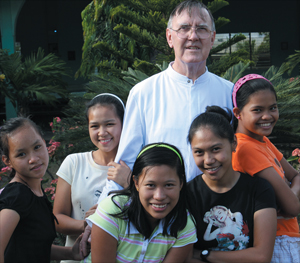
Fr Seán Coyle with friends at Holy Family Home
Marinela, 14, can hear to a limited degree. Since early this year she has been living at Holy Family Home for Girls [video], run by the Capuchin Tertiary Sisters of the Holy Family, in Cabug, on the outskirts of Bacolod City. Welcome Home referred Marinela to Holy Family Home.
When I arrived at Holy Family Home early this year I started reading a story book for children. Then an aspirant named Sr Maricel taught me how to read well.
When June was approaching Sr Lorena Sacal TC, Directress of Holy Family Home, told me that I would be studying in Cabug Elementary School. It is a school for normal students and so I was afraid because in my former school for deaf student we don’t have Filipino, the national language, as a subject.
I was afraid too because my classmate were naughty. But my teacher was very concerned about and patient with me. And I found a friend in Holy Family Home who accepted me as I am. Her name is Jovelyn. And my other companions are good to me. I feel that the Sister and staff of Holy Family Home are good to me. They and the staff of Welcome Home Foundation have loved and supported me. That is why I have now developed confidence to talk and to try to learn Filipino. In fact I passed the examination in school.
And I am trying also to be good and to learn more.
Just like Father Thomas I started to face my fears even if many times I have cried. But I’m happy to be me and to be loved by God.
‘I will help you carry your cross’
By Luda Egbalic
When I was a child I used to visit San Isidro Cathedral in Malaybalay City, Bukidnon, where I grew up. I would go to the Mass Media Center and read stories of the saints. I was inspired by their good deeds and sacrifices for the Lord. One time when I was praying and gazing at the big cross on the altar, innocently I said to myself, ‘When I grow up, I will help you carry your cross. I will serve you.’

Malaybalay City, with San Isidro Cathedral, lower left.
After my college days, I joined the Canossian Volunteers Philippines. In this program, I was happy serving people in urban and rural areas of Mindanao and Luzon. We called ourselves ‘young missionaries’.
After working as a teacher in a public school for four years, I tried the convent. I will be always grateful to the Canossian Daughters of Charity for during my postulancy I realized that while I wanted to serve God,religious life wasn't my calling. I felt that I was more free and at peace serving God asa Lay Missionary.
I left the Congregation with the blessing of the Sisters. Our loving God has been very generous to me. I found a job after leaving the convent in San Isidro College, Grade School Department, Malaybalay City where I worked for almost nine years. I savored the love and goodness of God through my school community where I felt I belonged. Indeed, I was aware of God's providence in my life. I thought that to be a teacher was my calling.
One precious night, I found myself seemingly empty and restless. In my silence I heard a voice within me asking me, ‘Can you still remember what you really desired when you were in the convent?’ When I visited my past, I remembered my desire to become a lay missionary. It was difficult at first to let go of my comforts and ‘securities’ but our faithful and loving God kept disturbing me until I found the courage to say ‘yes’ to His call. Yes, it was God's love that empowered and enlightened me to leave my comforts and embrace the life of the lay mission as a Columban Lay Missionary.
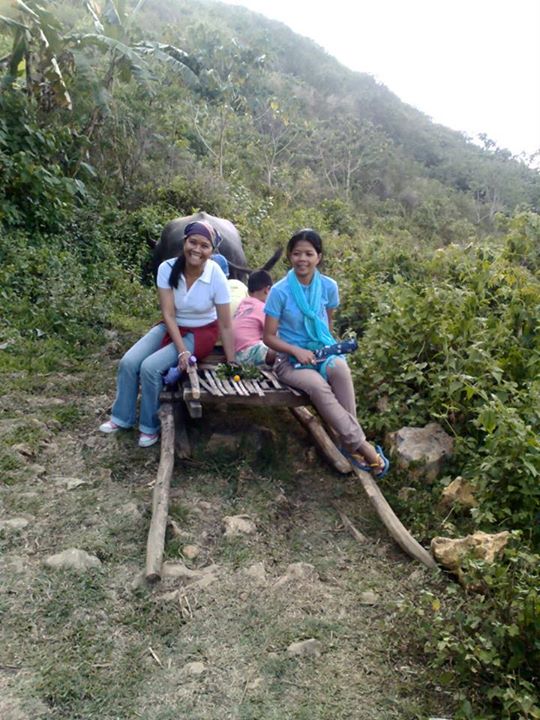
The author with fellow missionary Jen having a taste of
missionary life.
This was therefore a fulfillment of my heart's deepest desire and my expression of thanksgiving to God’s love for me and for the people so dear to me. I believed that God had truly called me to become a lay missionary and that this was my vocation.
There were times when I doubted my decision, especially when I was looking for my ‘temporal comforts’. When you read the newspapers or watch the news on TV, it seems that there is no end to injustice, discrimination and prejudice, poverty, war, and so on. in the Philippines and around the world. Nevertheless, I was inspired again during my prayers and when I remembered the missionaries who had already ‘aged’ in serving God's people peacefully, joyfully and faithfully.
My Mindanao exposure during our nine months of orientation as Columban Lay Missionaries was an experience that affirmed me in my vocation. Getting to know the people in Sitio Tinago, Katipunan, Sinacaban, Archdiocese of Ozamiz, where ColumbanFr Brendan Kelly is assigned, I saw the struggles of the ordinary people there and how much they toil in order to survive. Their place is called SitioTinago - ‘tinago’means ‘hidden’ - because it isn't yet accessible to vehicles. Most of the people there have to bring their products to the market on foot or by horse, if they have one. On their plots of land they plant sibuyas, dahonandsayote(onions, chili and squash).
Once, we stopped at a little store where the ‘tatays’(‘dads’) relaxed after a hard day’s work drinking tuba (coconut wine). Onetatay said ‘We are happy with your visit. Can you suggest what we can plant in our little bits of land besides sibuyasdahon and sayote?’Jokingly, he continued, ‘Or what are other ways of cooking sayote as our viand? You see, we are just ordinary and poor farmers.’
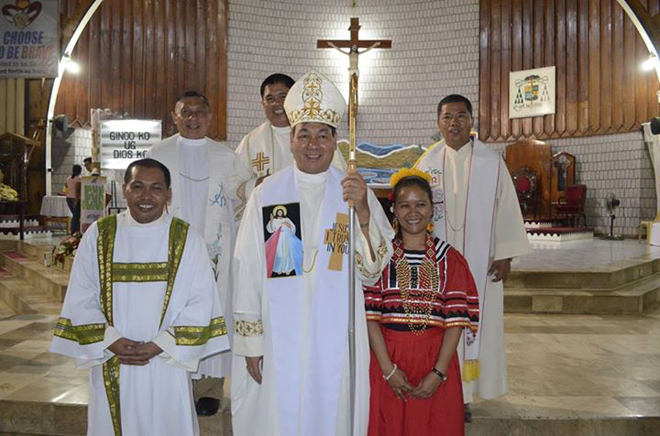
Mission sending.
I sensed frustration and tiredness in the men’s remarks but we successfully created a lighter atmosphere so that eventually we all ended sharing a good laugh. It was for me a beautiful encounter.
Ate Myrnafrom the Subaanen tribe introduced organic farming, which isn’t a common strategy, and requiresmuch hard work and dedication. Ate Myrna in her simplicity and humility expressed her desire to continue sharing with her fellow Subaanens what she has learned about organic farming. I affirmed her by telling her that this was her mission.
Ate Myrna, the tatays who were grateful for our short visit andother individuals and friends I have encountered along the way have inspired me in my faith and journey as a missionary.
However, Brother Karl Gaspar CSsR, a Redemptorist Brother, is for me the most inspiring and empowering lay missionary. In him, I have felt how much God loves his people. He claimed that although he is a religious brother he is still a lay missionary. I have seen and felt his love, dedication and commitment serving the poorest among the poor in many mission areas in the Philippines, particularly in Tacloban City and Leyte.I got to know Brother Karl when I was a member of the Cebu Redemptorist Urban Mission Team in Birhensa Regla Parish, Lapu-Lapu City from 2009 until 2013. Many times he gave emphasis and sublime importance to the role of the laity in the mission of the Church.
It is my joy to respond courageously and humbly to the call of God's mission by crossing the boundaries of culture, race, and gender. My first assignment, with Jenanydel Nola as ‘PH21’, is Korea. I came to Korea at the end of Maywith the love, inspiration and encouragement of many people, lay, religious brothers and sisters, priests and family, whom I met on my journey before, during and after the CLM orientation. Above all I believe that God's love is with us as we face the challenges of being in Korea and learning its language and culture.
St Columban, pray for us.
Peace by Peace

‘If you want to make peace, you don't talk to your friends. You talk to your enemies.’
-Blessed Mother Teresa of Calcutta


Pope Benedict XVI, 2007 [Wikipedia]
‘Love of God and love of neighbour are thus inseparable, they form a single commandment. But both live from the love of God who has loved us first. No longer is it a question, then, of a “commandment” imposed from without and calling for the impossible, but rather of a freely-bestowed experience of love from within, a love which by its very nature must then be shared with others. Love grows through love. Love is “divine” because it comes from God and unites us to God . . .’
–I Believe in One God: The Creed Explained, Benedict XVI

.jpg/1024px-Canonization_2014-_The_Canonization_of_Saint_John_XXIII_and_Saint_John_Paul_II_(14036966125).jpg)
Pope Francis [Wikipedia]
‘Resentment is like a full house with lots of people crammed inside so they can't see the sky, while pain is like a city in which there are still lots of people, but at least you can see the sky. In other words, pain is open to prayer, tenderness, the company of a friend and thousands of things that offer dignity. That's why pain is a healthier situation than resentment.”
Pope Francis: Conversations with Jorge Bergoglio, Sergio Rubin and Francesca Ambrogetti, 2010.


Fishermen by Moonlight, HendrickAvercamp, 1620s
Rijkmuseum Amsterdam [Web Gallery of Art]
‘The environment is God’s gift to everyone, and in our use of it we have a responsibility towards the poor, towards future generations and towards humanity as a whole. . . The Church has a responsibility toward creation and she must assert this responsibility in the public sphere. In so doing, she must defend not only earth, water and air as gifts of creation that belong to everyone. She must above all protect mankind from self-destruction . . . Our duties towards the environment are linked to our duties towards the human person, considered in himself and in relation to others. It would be wrong to uphold one set of duties while trampling on the other.
–Pope Benedict XVI, On Integral Human Development in Charity and Truth (Caritas InVeritate), 2009, paragraphs 48 & 51.


St Francis in Meditation, Caravaggio, c.1606
Galleria Nazionaled'ArteAntica, Rome [Web Gallery of Art]
‘Not to hurt our humble brethren is our first duty to them, but to stop there is not enough. We have a higher mission - to be of service to them wherever they require it.’
-Saint Francis of Assisi
Our Hideaway

By Gracebelle Montecillo Parreño
Seven years ago, someone broke my heart. It was shattered into pieces to the extent that it even made me think that it couldn’t be repaired again. It made me weak and I lost my self-esteem. I started questioning myself if there was something wrong with me. Then my mother came into the picture and said to me, ‘Come to Him and pray for him; surrender all your heartaches to Him and you’ll be alright.’
From then on, I became a frequent visitor to the Adoration chapel. I always cried there and I spent months talking to Him, sharing my problems with Him. Every time I left that chapel, I felt great as, if I was whole again. I became strong; I got back my confidence and became a smiling person.
I was like that until I graduated from college. Then it was time for on-the-job training (OJT), I tried my best with all the companies that came to our school but I ended up a failure. At first I asked myself if I had done wrongbut then came to realize that I just needed to trust Him in whatever plans He had for me.

The new couple sharing a chat with Misyon editor Fr Seán Coyle.
Three months later a company came along and I was hired as their new OJT employee. I met many people, learned practical things and befriended all of them except one. He was my mentor that time and we hated each other. He seemed to be so cruel to me; he didn’t want me to tag along with him. But on 1 May 2010, we were chosen to attend the production that day, only the two of us. It was the time that he knew I existed. We spent the whole day talking to each other and enjoying each other’s company.
That didn’t last only one day. Our friendship continued as time went by. After a few months, he started to ask if he could be my guy. I was so hesitant at first but then I offered God a prayer and asked Him if he was the one he had created for me. I gave him a chance and accepted him. After four years we decided to get married, and he is now my husband.
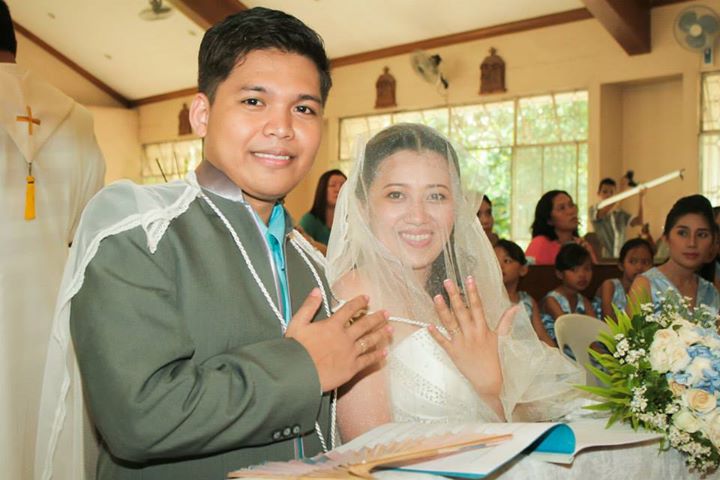
I am sharing our simple love story because I have learned something from it. As I looked back recalled all the events that had happened I saw that if I had passed the interview with a different company, I think I wouldn’t have met my husband. Then I realized that God in the very first place had created someone for each of us. We just have to wait, trust Him and let His plan dwell in us. In the end you’ll see that you have the best you’ll ever receive in your life.
I thank God for giving me my dearest husband. I will treasure and cherish every day with him because I know God created our love story in the very beginning.


